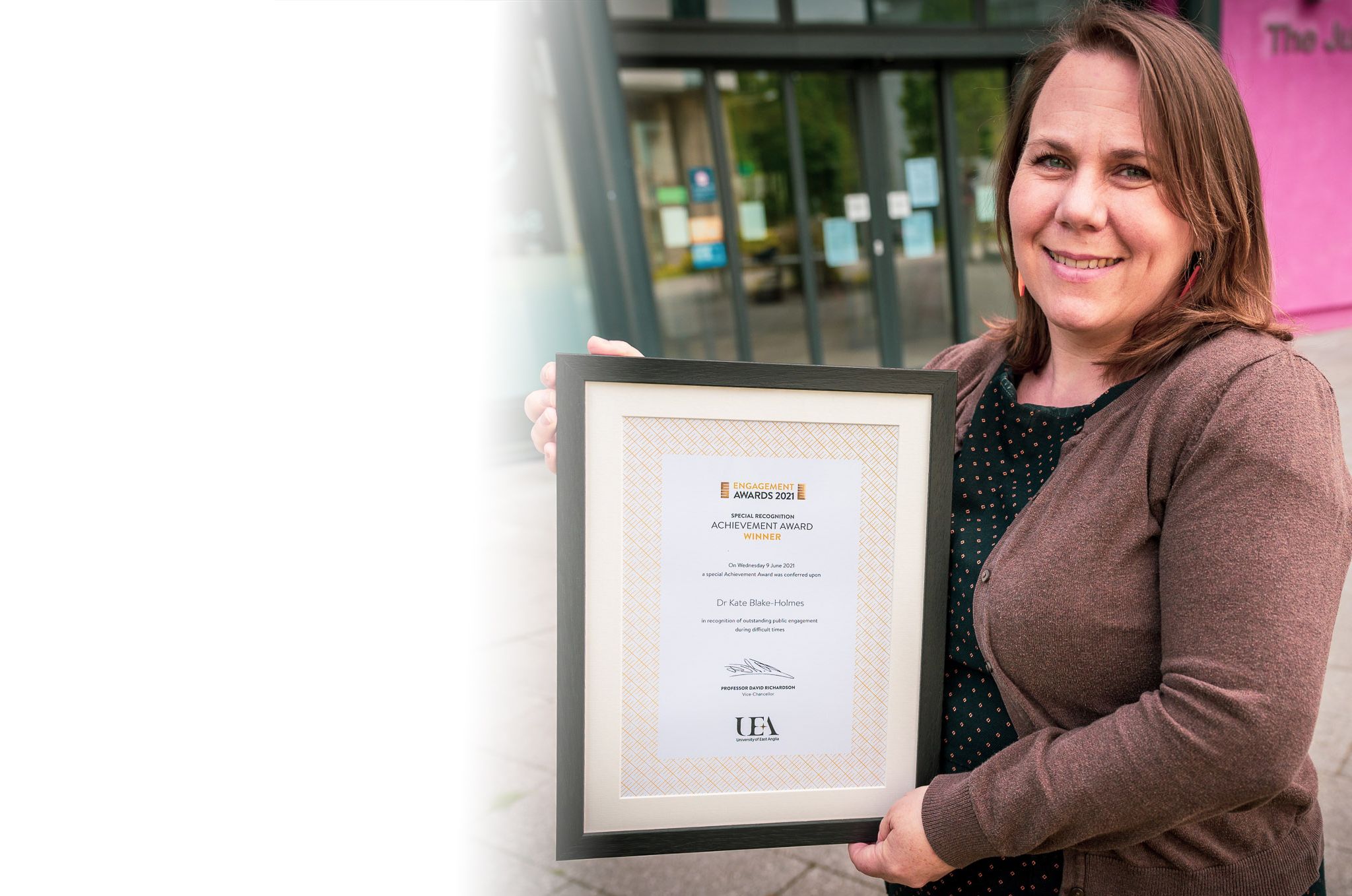UEA'S 2020/21
ENGAGEMENT AWARD
WINNERS

Since their inception in 2009, the UEA Engagement Awards have celebrated and recognised public engagement by students, staff, academics and departments from UEA and the Norwich Research Park.
This year’s crop of public engagement is as varied and inspiring as ever, whether it’s transporting volcanoes across the globe or creating sea changes in cultural perception, with special recognition work carried out over this particular year.
STUDENT AWARDS
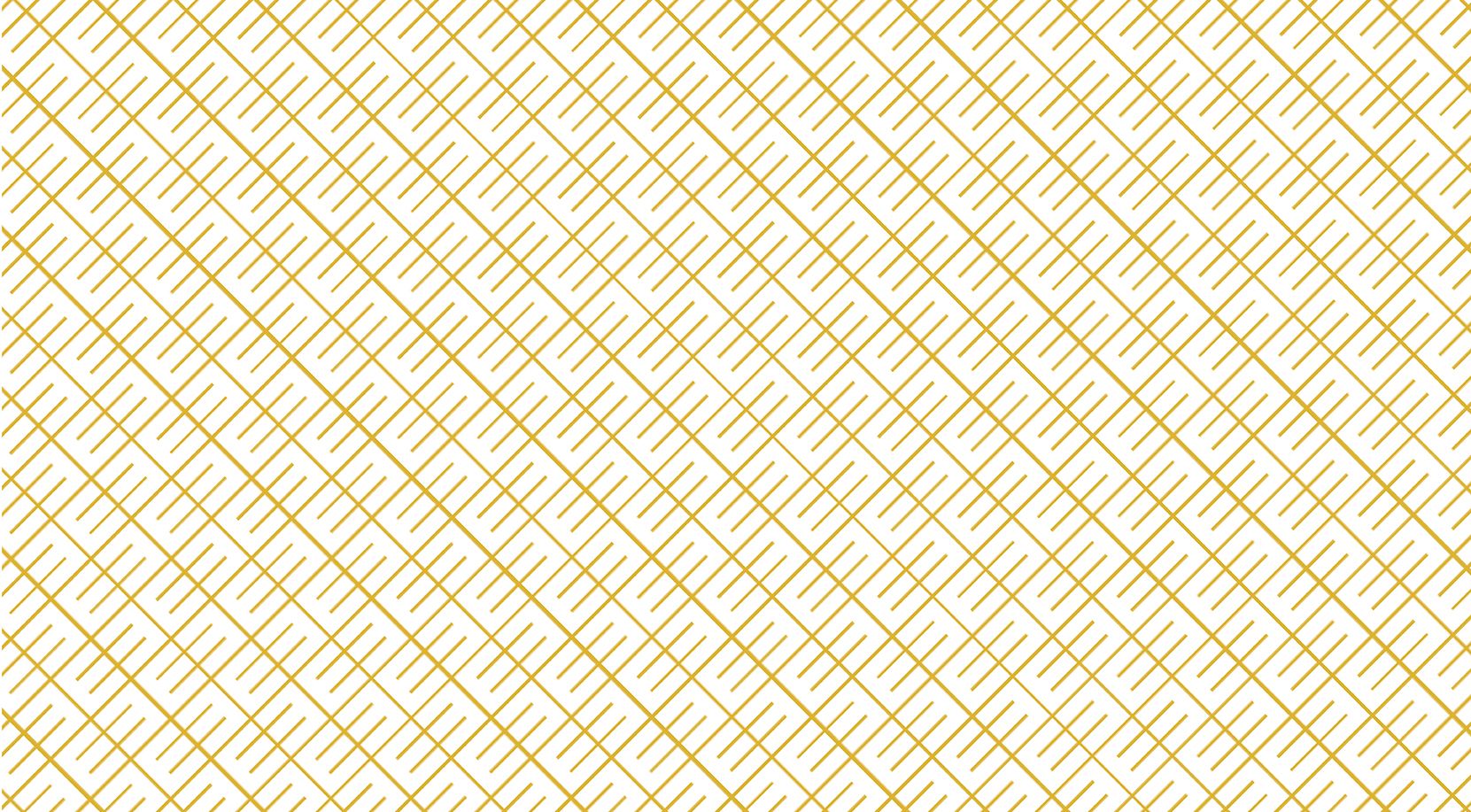
OLIVIA BREWIN
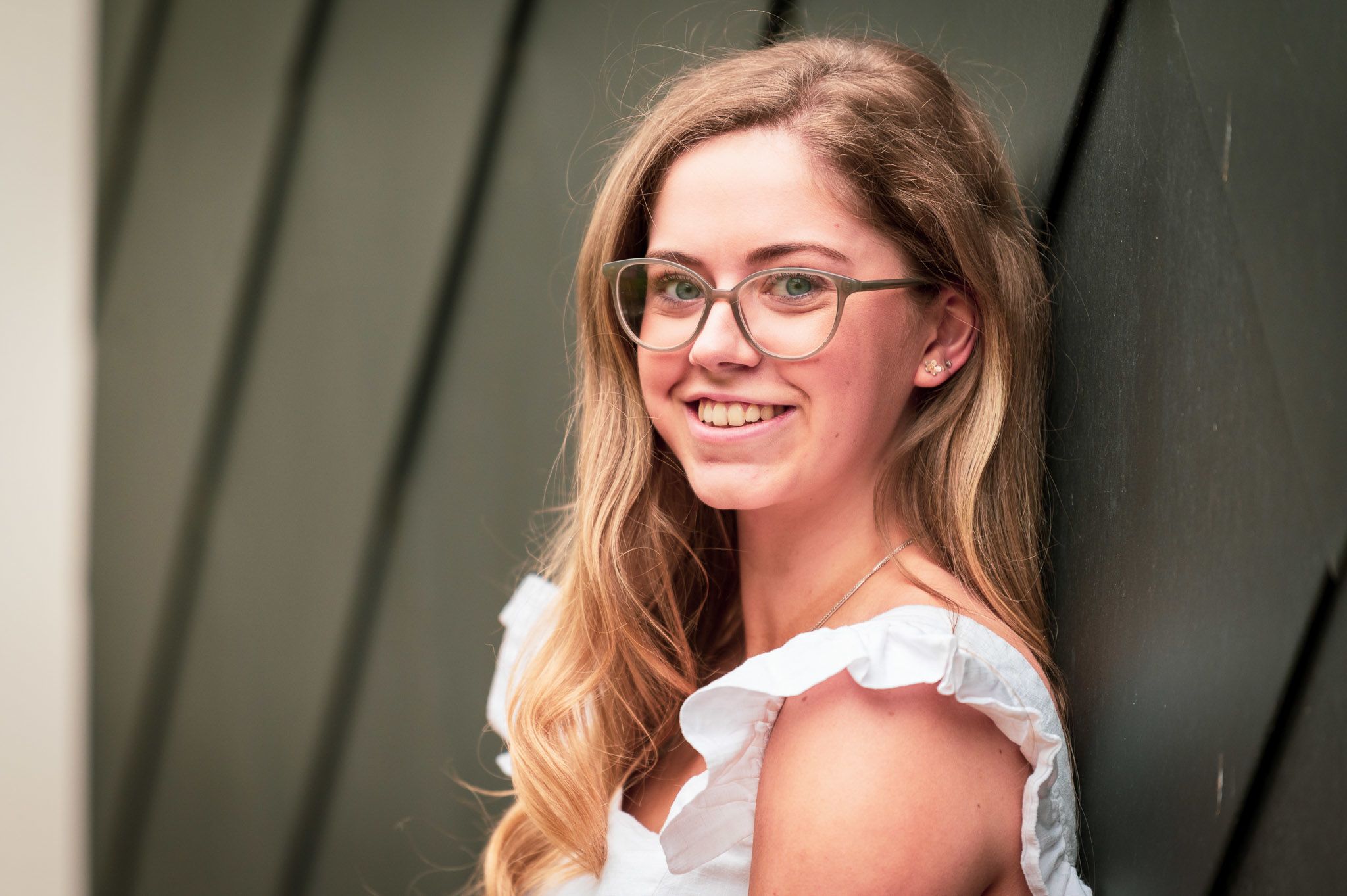
“I’ve always been passionate to advocate for those who were hidden in society. Seeing how children and adults with learning disabilities fought the odds yet remain so positive...” - Olivia Brewin
Olivia Brewin’s (School of Health Sciences) commitment to projects supporting the learning disability community have been outstanding during the past twelve months.
During the early days of the pandemic in May 2020, when it was realised that many support keyworkers were taking the difficult step to separate themselves from family members, Olivia was inspired to develop a tribute version of Over the Rainbow – encouraging her fellow classmates to learn sign language to participate in a video which received significant media attention, including TV’s Good Morning Britain.
Other projects were created for #LearningDisabilityWeek in June 2020 – such as Friendship in Lockdown, for which a virtual ‘quilt of friendship’ was created with students, practitioners and members of the public invited to submit a ‘patch’ for a virtual blanket of support.
And #ThisIsMe: another video choreographed by Olivia alongside fellow students Ella and Abbie.
#ThisIsMe
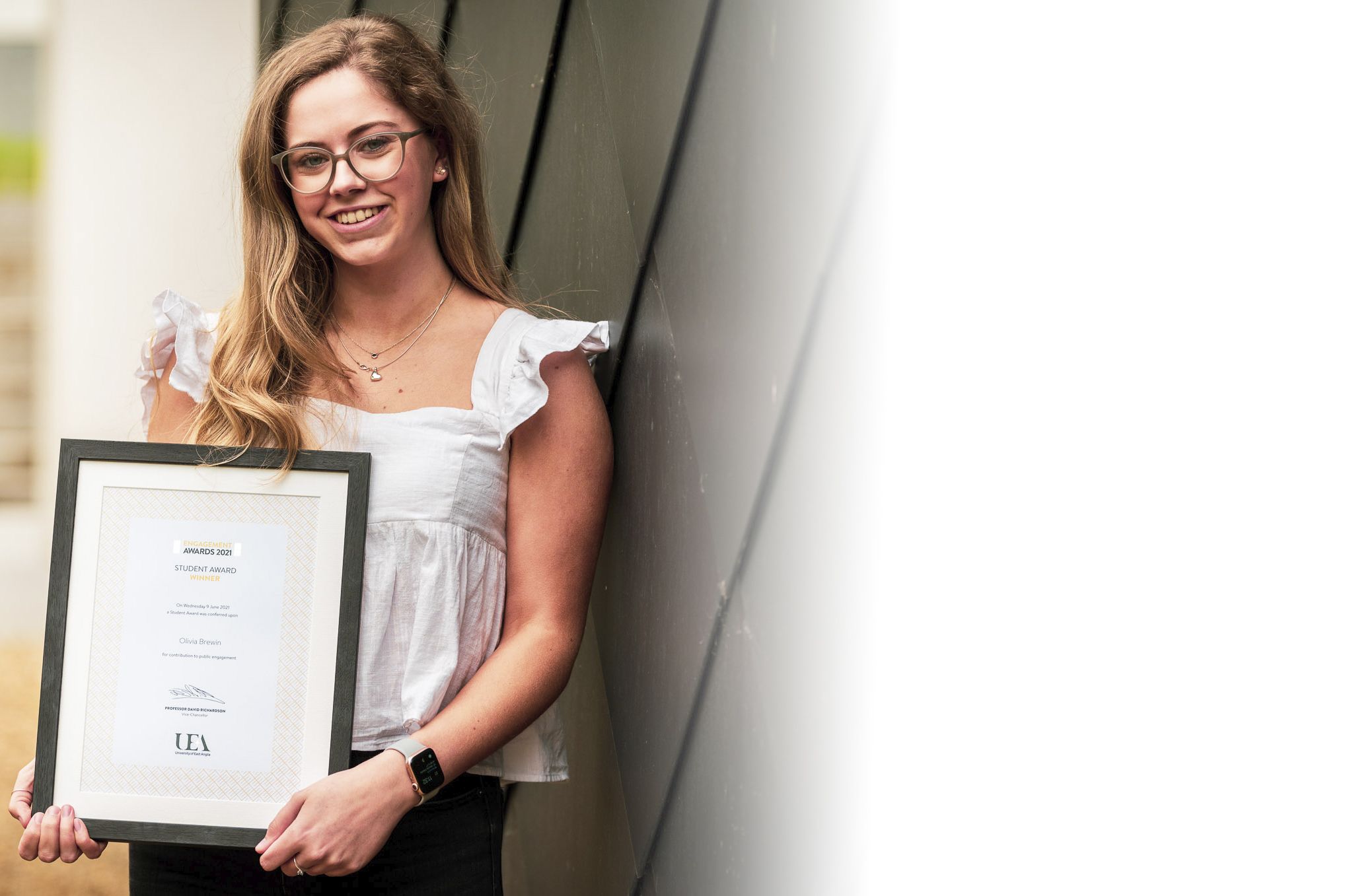
BLACK LIVES MATTER SEMINARS
Alex Eaglestone, Aimée Ibarra, Briony Randell, Clarice Nicol, Hamda Ahmed, Jim Gell, Melis Erdem, Molly-Rose Medhurst, Moe Suzuki, Nana Mills-Robertson, Shannon Clinton Copeland, Xing Huang
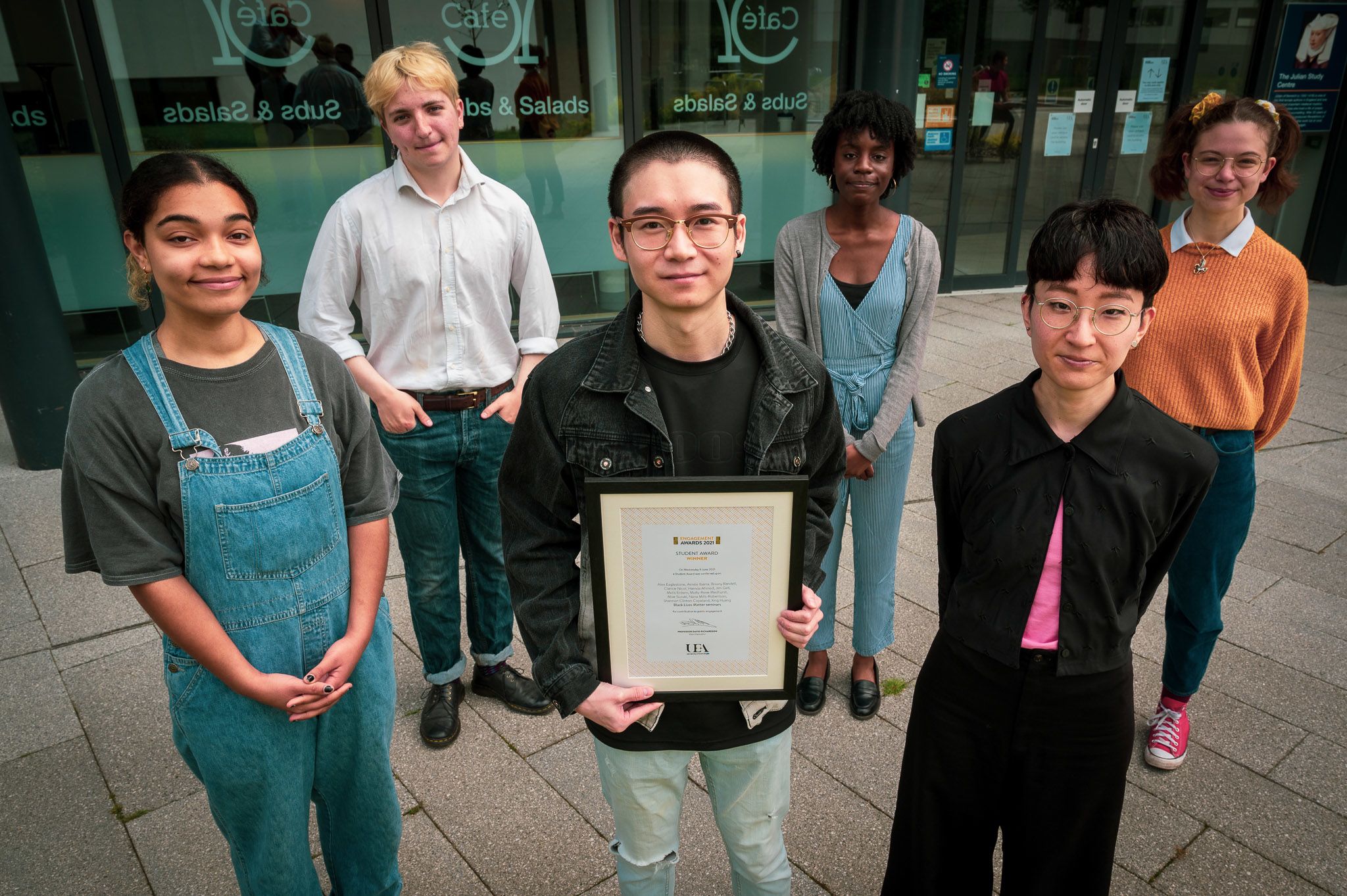
l to r: Aimee Ibarra, Alex Eaglestone, Xing Huang, Clarice Nicol, Moe Suzuki and Melis Erdem
l to r: Aimee Ibarra, Alex Eaglestone, Xing Huang, Clarice Nicol, Moe Suzuki and Melis Erdem
DECOLONISE UEA SOCIETY
Arzhang Pezhman, Jake Barrett-Mills, Megan Pay, Moe Suzuki, Rhy Brignell, Surya Simon
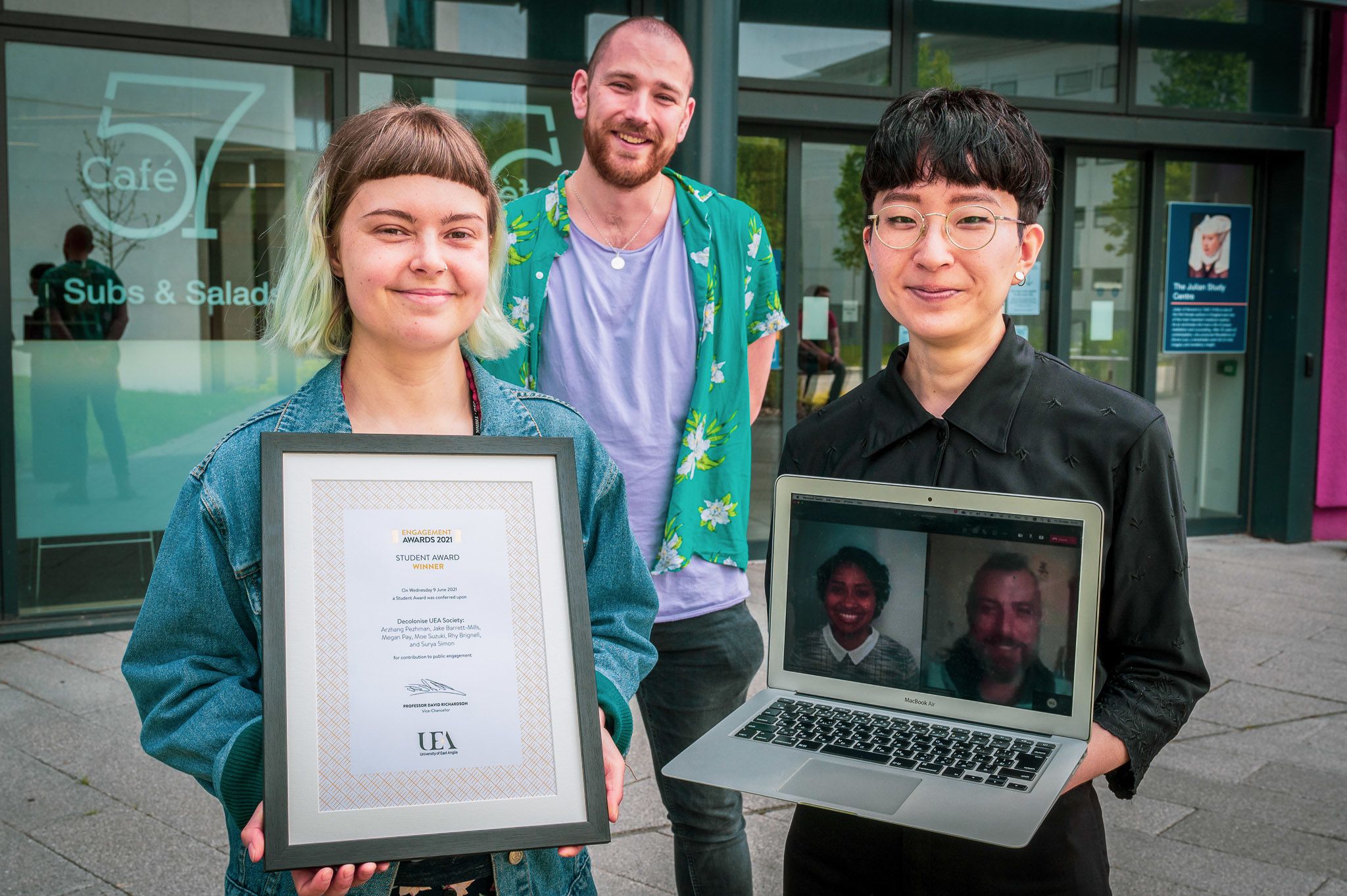
l to r: Megan Pay, Jack Barrett-Mills and Moe Suzuki - joined on Zoom by Surya Simon (left) and Arzhang Pezhman (right)
l to r: Megan Pay, Jack Barrett-Mills and Moe Suzuki - joined on Zoom by Surya Simon (left) and Arzhang Pezhman (right)
DECOLONISING ACADEMIA SEMINARS
Francesca Chiu, Touseef Mir, Moe Suzuki
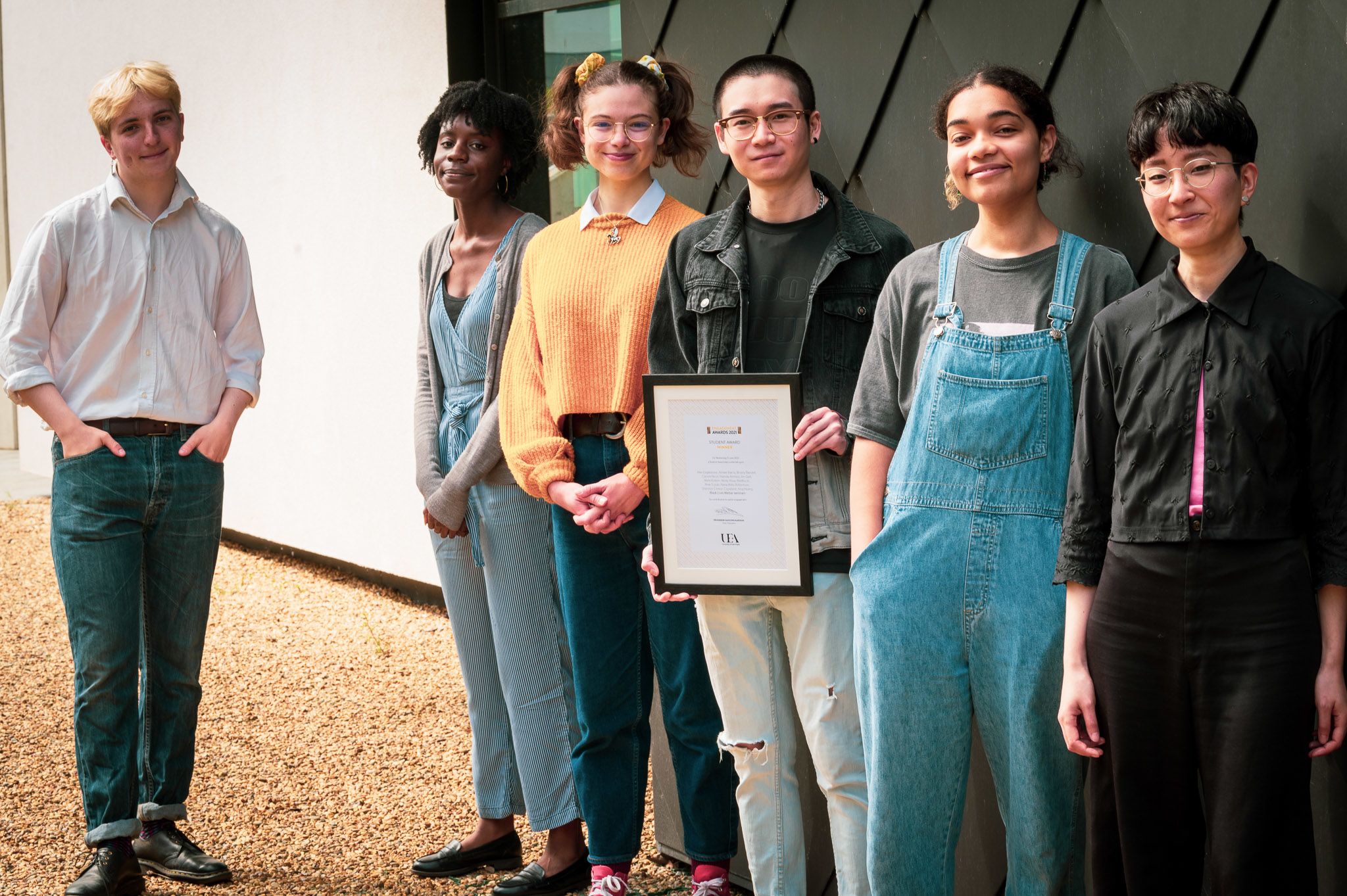
l to r: Alex Eaglestone, Clarice Nicol, Melis Erdem, Xing Huang, Aimee Ibarra and Moe Suzuki
l to r: Alex Eaglestone, Clarice Nicol, Melis Erdem, Xing Huang, Aimee Ibarra and Moe Suzuki
When the Awards panel received three submissions with a crossover of theme and students involved, they recognised that there were different emphases to each, but saw a common thread: that of UEA student engagement with social movements rooted in an opposition to racism and colonialism.
The Black Lives Matter (BLM) seminar series brought the BLM movement into the university experience and created links with the wider struggle for Black lives.
Decolonise UEA Society and Decolonising Academia Seminars looked more explicitly at the relationship between the university and the history and culture of colonialism. The panel wanted to recognise and celebrate the important work that all the applicants had achieved in these areas and decided to award the activity leads and ensure all students involved were named in the Award publicity.
Held between 7 and 11 September 2020, the Black Lives Matter Seminars focused on anti-racism and decolonisation in academia; programmed, publicised and moderated by a collective of undergraduate and postgraduate research students. The collective made a deliberate and successful effort to invite external speakers.
By connecting with the BLM movement outside of the University, the seminar series played a role in transforming the university into a better place for all. Safe space guidelines were created and distributed before and during the sessions, and have been used as a guiding document at the ‘Decolonising PPL’ working group when discussing how to create inclusive and supportive online spaces. The ‘Decolonise LDC’ student group also formed partially because of the event.
Fruitful and positive engagements were made with a range of external cultural and community organisations. Speaker organisations included; Cradle Community, Sisters Uncut, and black&brown. As most speakers chose to donate their fees, additional engagements were also made with the Black Cultural Archives, the George Padmore Institute and Imkaan. The collective is seeking opportunities to make the BLM seminar series an annual event.
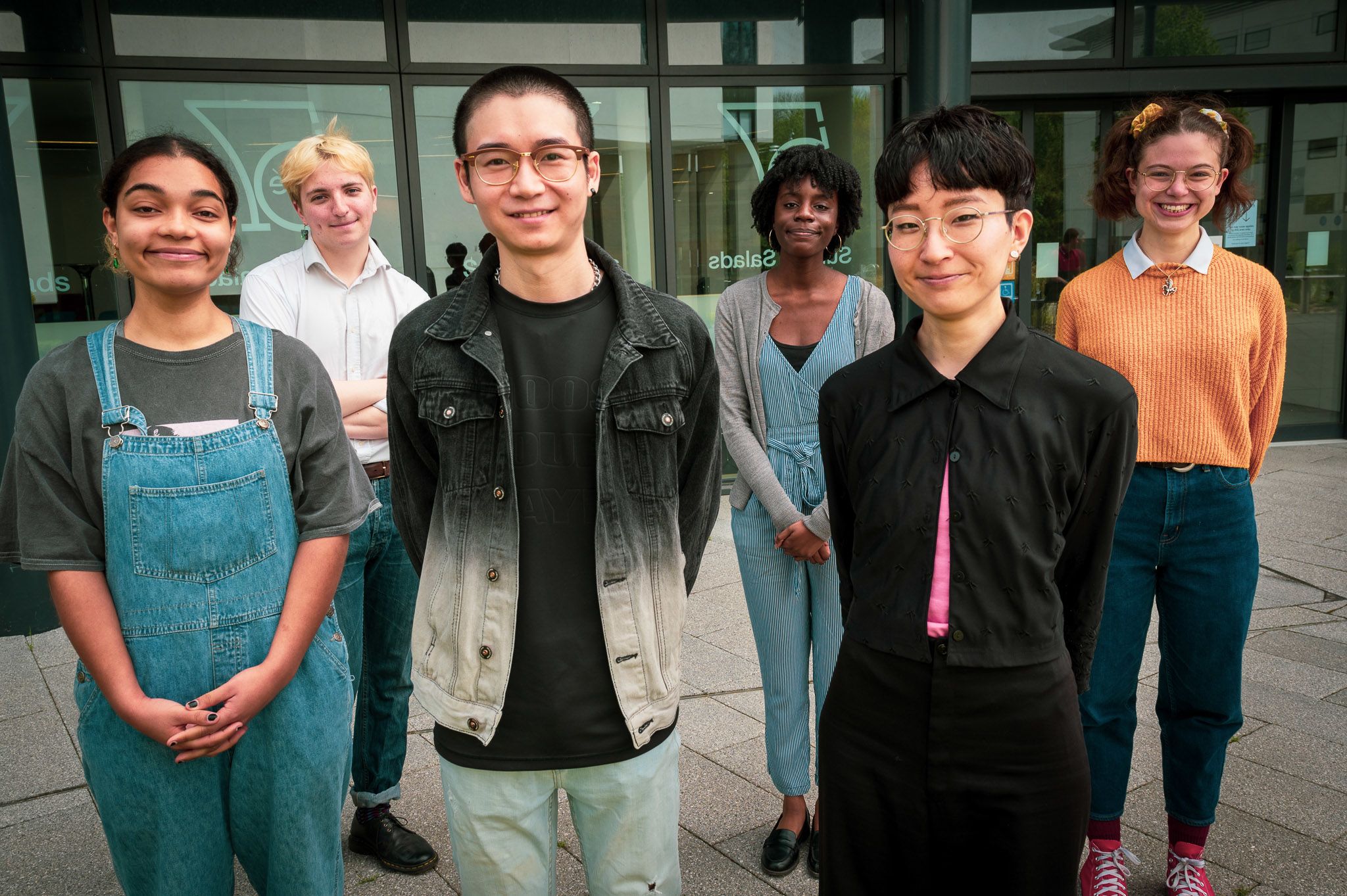


JAMES CANHAM
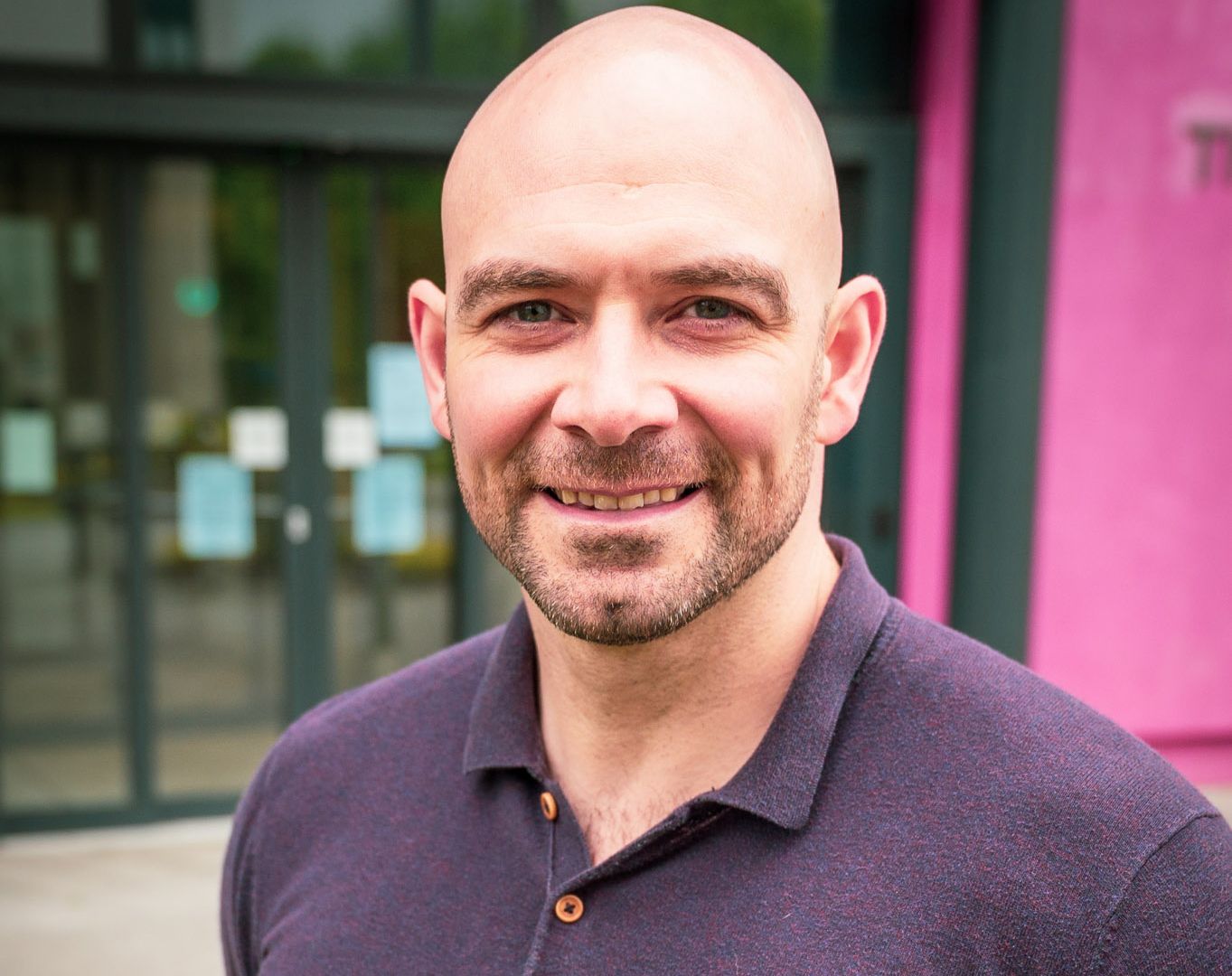
Alongside his PhD studies, James Canham has endeavoured to make the most of opportunities available to positively influence others – from Pint Of Science Festival to a UK-Kenyan Research consortium.
During his Professional Internship placement in 2019, James Canham from the (John Innes Centre) participated in the 2019 AfriPlantSci Summer School at Pwani University, Kenya, where he delivered training to a cohort of students and colleagues. This led to a knowledge exchange partnership with scientists at KEMRI-Wellcome Trust in Kilifi and the founding of the UK-Kenya Research Consortium for Emerging Insect-Vectored Plant Diseases in East Africa.
The consortium, consisting of members from the John Innes Centre, the Kenya Plant Health Inspectorate and Pwani University, is engaging with farmers and stakeholders to mitigate the impact of (re)emerging crop diseases in the region.
One major outcome of the work is the formal identification of the pathogen associated with a highly destructive disease of coconut: lethal yellowing disease, with rapid diagnostics of the disease and engagement with farmers to mitigate the spread of disease. This work is ongoing, and holds great potential to reach a broad audience and effect positive change.
James' research is funded by the UKRI-BBSRC Norwich Research Park Biosciences Doctoral Training Partnership.
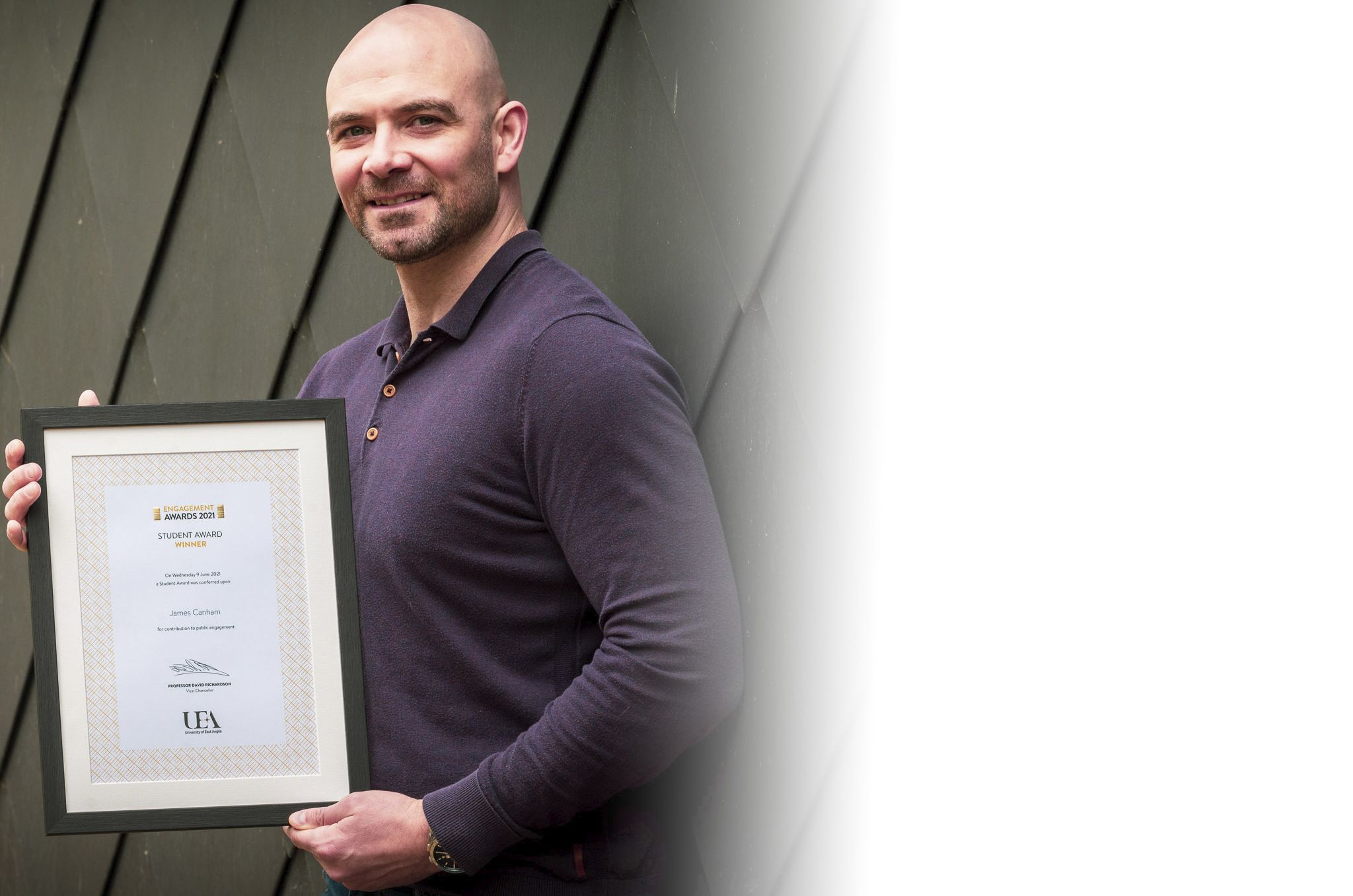
BRIDIE DAVIES
“The joy of researching volcanic processes comes from a direct connection with nearby communities and the ability of these spectacular phenomena to capture the imagination of the public” - Bridie Davies
Through engagement with the Soufriere Blow and Mountain Aglow exhibitions as part of the STREVA project on St Vincent and Montserrat, Bridie Davies (School of Environmental Sciences) engaged with multiple collaborators to develop worksheets for children aged 5 – 15 to guide their learning experience. Crystal Journey was successfully deployed both at the Norwich Science Festival, and in the Caribbean where the exhibits now reside.
Bridie has participated in the Norwich Science Festival four times, sharing her enthusiasm for rocks, Alka-Seltzer volcanoes, party popper volcanic hazard simulations, and a Soapbox Science talk featuring dry ice! In 2020 she took a lead role in filming Lunchtime Lava: short films with experiments children can do at home.
Bridie continues to push herself to find new ways to tell science stories through the co-development of an offline teaching resource for school children learning from home during lockdown with limited access to the internet.
Bridie’s PhD research is funded by the EnvEast Doctoral Training Partnership.
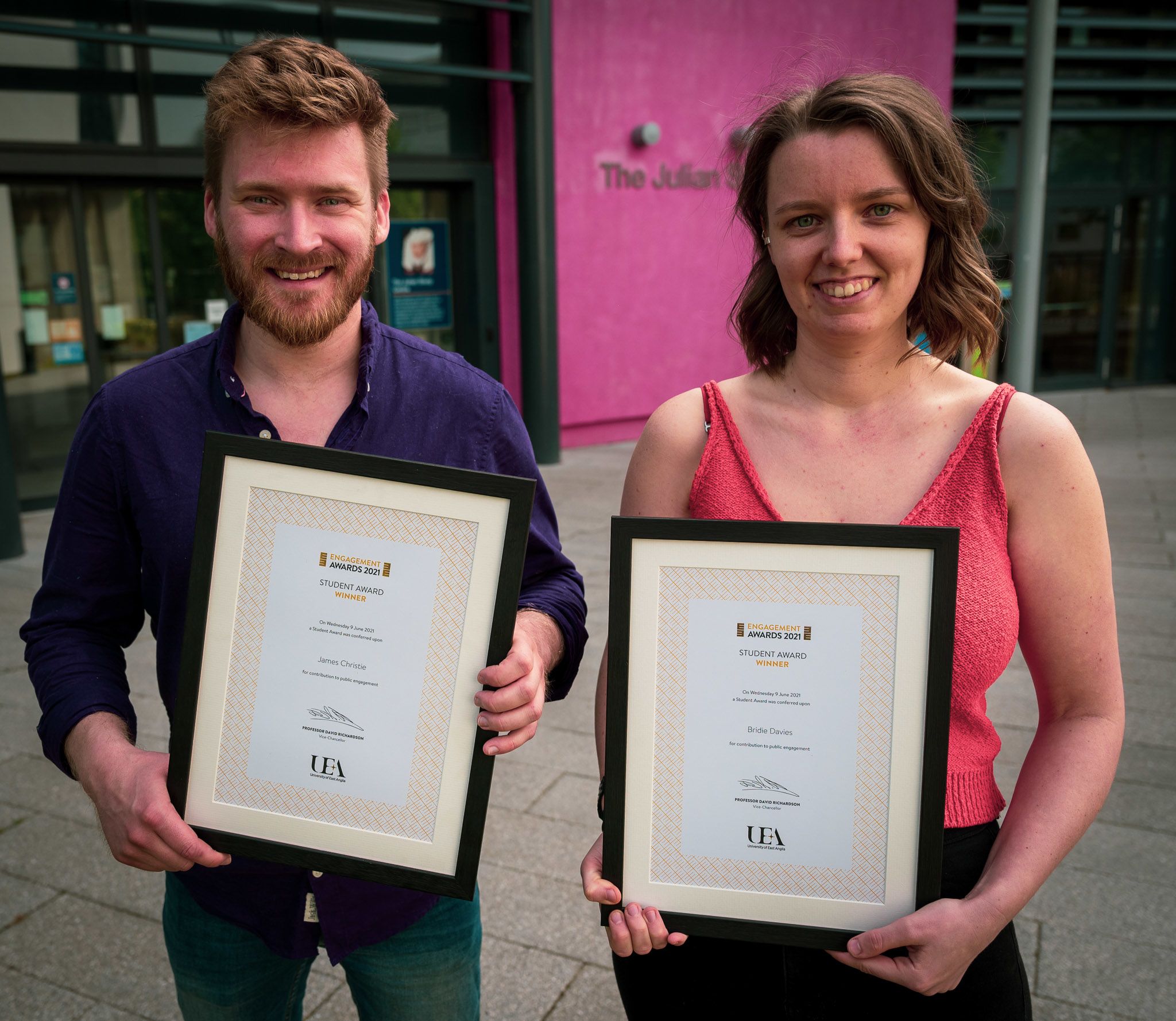
JAMES CHRISTIE
James Christie is a passionate science communicator who has contributed to Norwich Science Festival events for the past three years with UEA’s Earth Sciences team and the E3i Committee.
James Christie (School of Environmental Sciences) was a member of the Soufrière Blow team in 2018. This project aimed to interweave scientific risk communication about, for example, the explanation of volcanic activity, with socio-cultural risk messages derived from songs, poems and stories created in response to experiences of historical eruptions. James’ role also involved the transportation of the exhibit – a very large model volcano – from UEA to St Vincent, where he provided support for public outreach during Volcano Awareness Week.
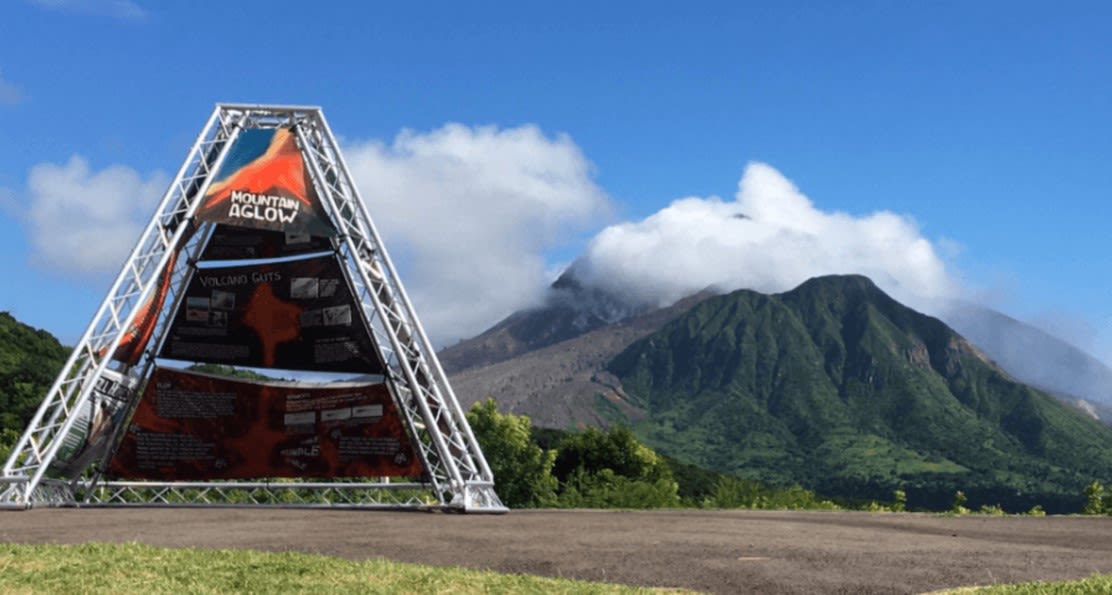
Mountain Aglow exhibit on the Montserrat Volcano Observatory helipad - Soufriere Hills Volcano in the background
Mountain Aglow exhibit on the Montserrat Volcano Observatory helipad - Soufriere Hills Volcano in the background
James went on to join the Disaster Passed project team in 2019, which had a similar focus on Montserrat, another Caribbean Island, and resulted in the Mountain Aglow website: www.mountainaglow.com
Jenni Barclay, Professor of Volcanology, School of Environmental Sciences, said: “James went considerably beyond what was expected...and contributed a huge amount to the website which is being used by schoolchildren in Montserrat to develop their own Disaster Risk Reduction messages and create their own panels for the exhibit.”
James' PhD research is funded by the EnvEast Doctoral Training Partnership.
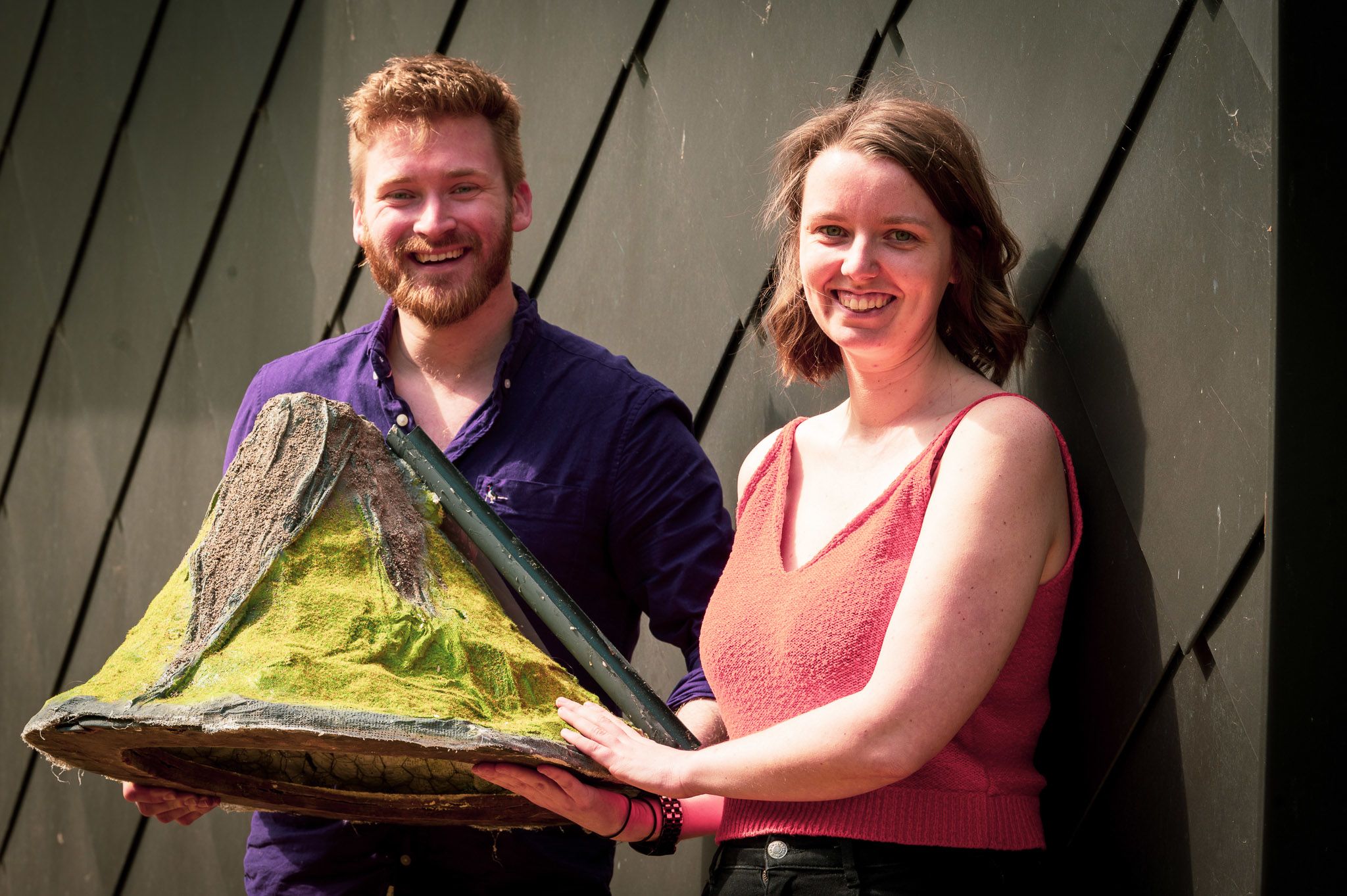
NEFTALY DE JESύS CRUZ MIRELES
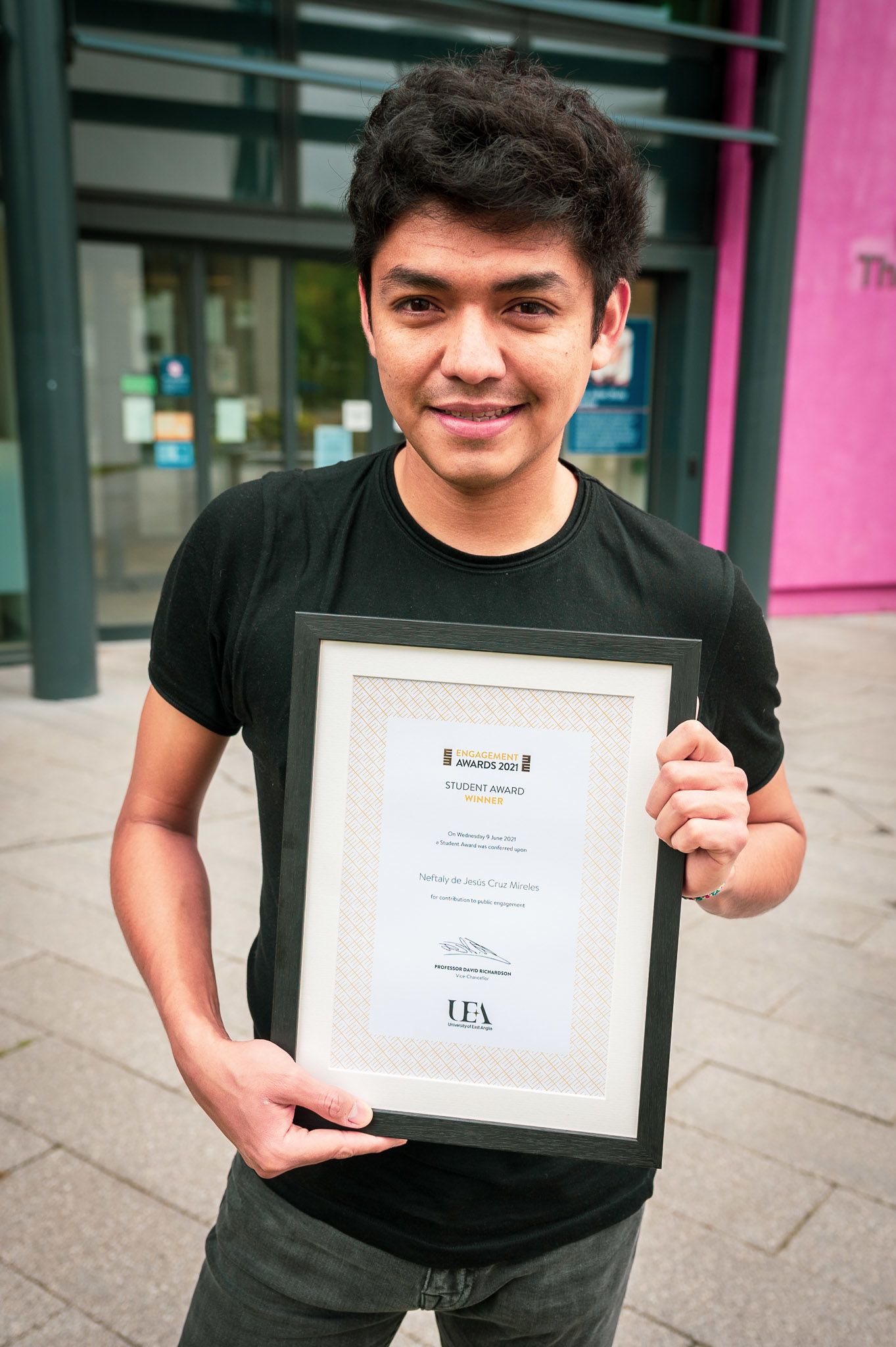
Neftaly has been active in public engagement since an undergraduate in Mexico; planning scientific fairs, workshops, seminars and exhibitions for rural communities. His science communication has continued while at UEA.
During the last three years, Neftaly de Jesús Cruz Mireles (School of Biological Sciences and The Sainsbury Laboratory (TSL)) has contributed numerous articles to free, non-profit online magazines in Mexico – Buzos and Ciencia Cakotanúare - making recent discoveries on different plant-related topics accessible to public audiences.
During the pandemic over the past year, Neftaly formed Ciencia Cakotanú: a non-profit organisation which offers online science talks on social media platforms. He has also collaborated with a Mexican radio programme to present scientific news on Facebook Live during the lockdown.
Neftaly organised a plant development workshop for children as part of TSL activities for the 2019 Norwich Science Festival and has volunteered as a mentor/teacher for high school students in scientific camps in Mexico, Russia and Spain - working with international organisations such as the International Movement for Leisure in Science and Technology and La Pedrera Foundation to share his knowledge on molecular biology and biochemistry - guiding students through their scientific projects.
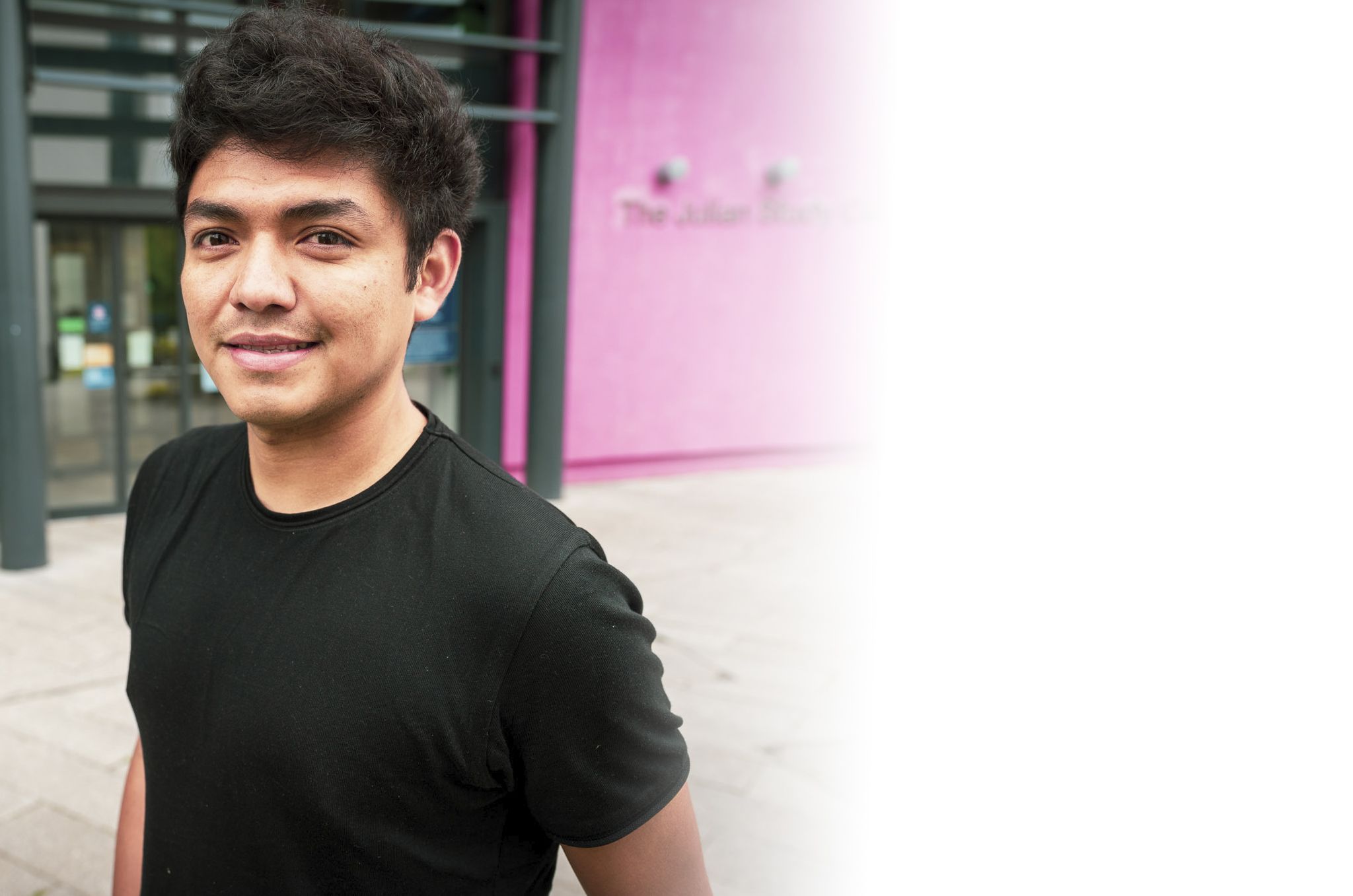
DANNY WARD
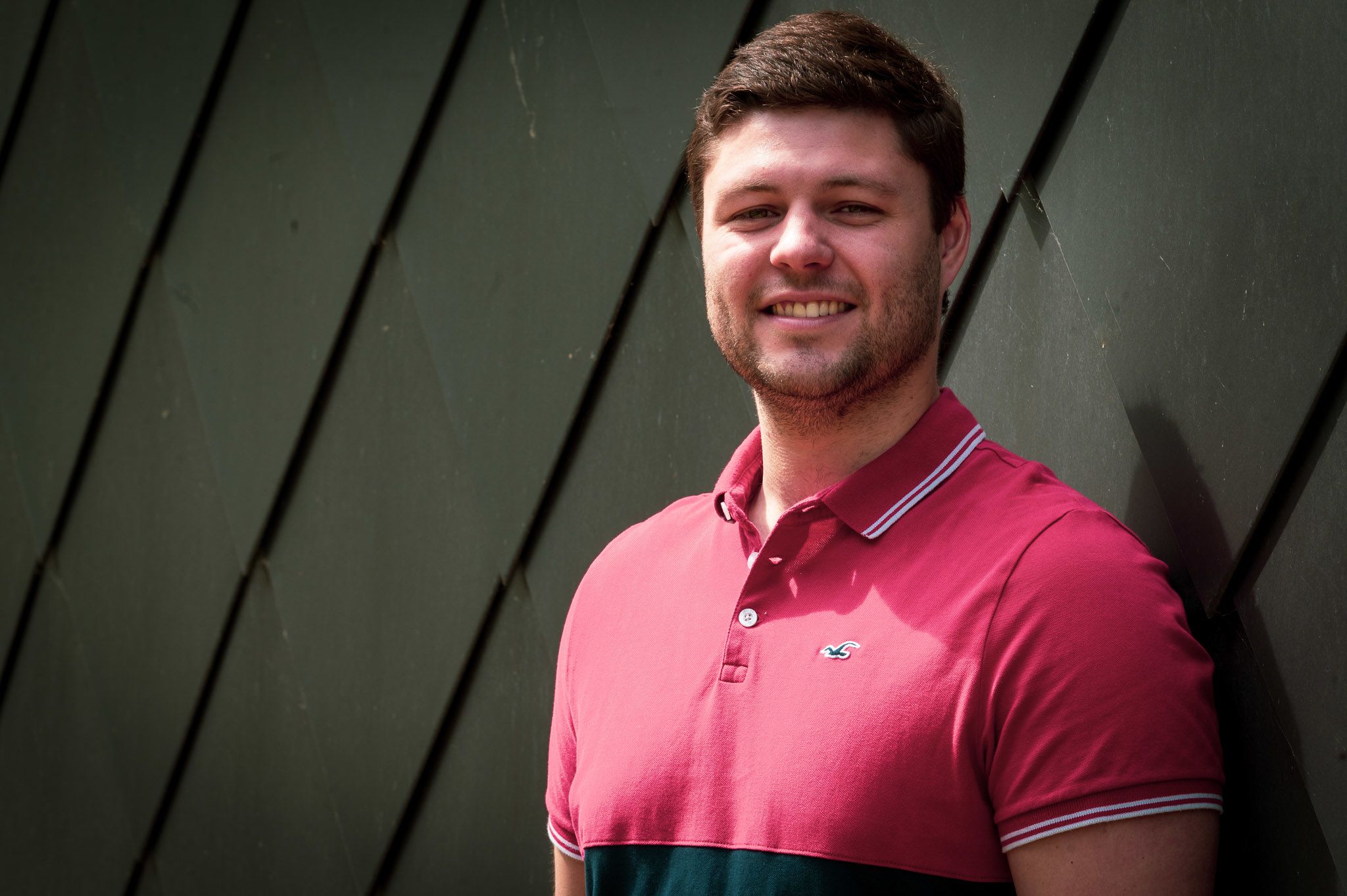
Carrying out scientific engagement during the pandemic has been a challenge to which Danny Ward has risen with flexibility and dedication with research podcasts, Twitter projects, photography and blog collaborations.
Every week across the past year Danny Ward (School of Biological Sciences and John Innes Centre) has highlighted a different microbial species as part of the #52Species project on Twitter. Danny also founded, and runs, TheSciCommCollective (@Sci_Comm_) Twitter profile.
Danny recently started a podcast called Research in Plain English, explaining open access research papers using accessible language. Episodes are designed to be under ten minutes to help increase their appeal.
Throughout his PhD, Danny has taken photos of his work in the lab and published over 180 of these images onto Flickr and registered them as public domain (creative commons zero license).
Midway through his PhD, Danny started an educational YouTube channel called Knowledgica, which continues today. Alongside the above, Danny has taken part in a New Scientist Jobs article, the British Society for Plant Pathology 40 Faces of Plant Pathology project, an Instagram account take-over of the John Innes Centre profile and a blog collaboration with MicroBites.
Danny's research is funded by the UKRI-BBSRC Norwich Research Park Biosciences Doctoral Training Partnership.
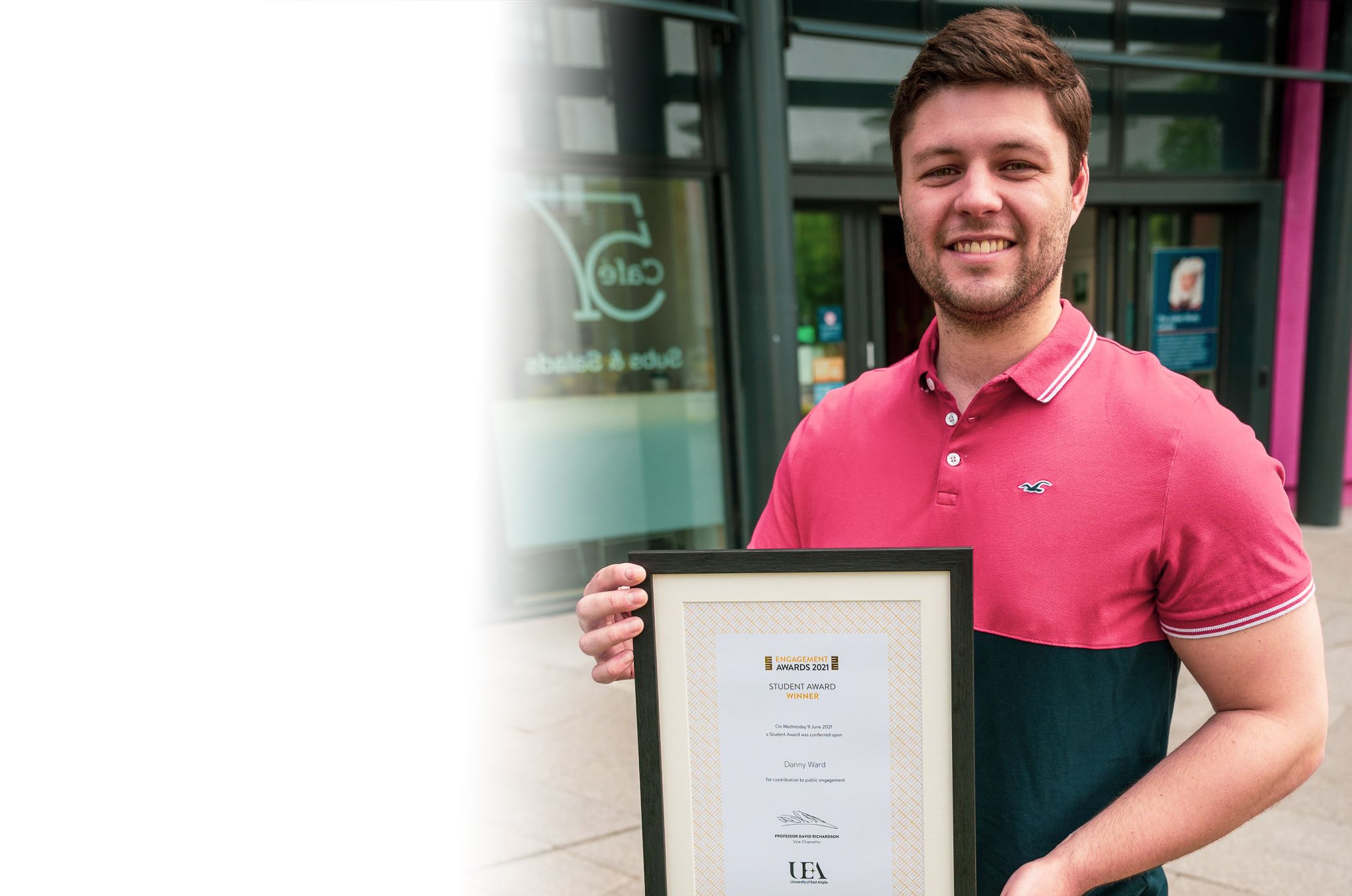
SPECIAL RECOGNITION STUDENT AWARD
PE'ND ONLINE
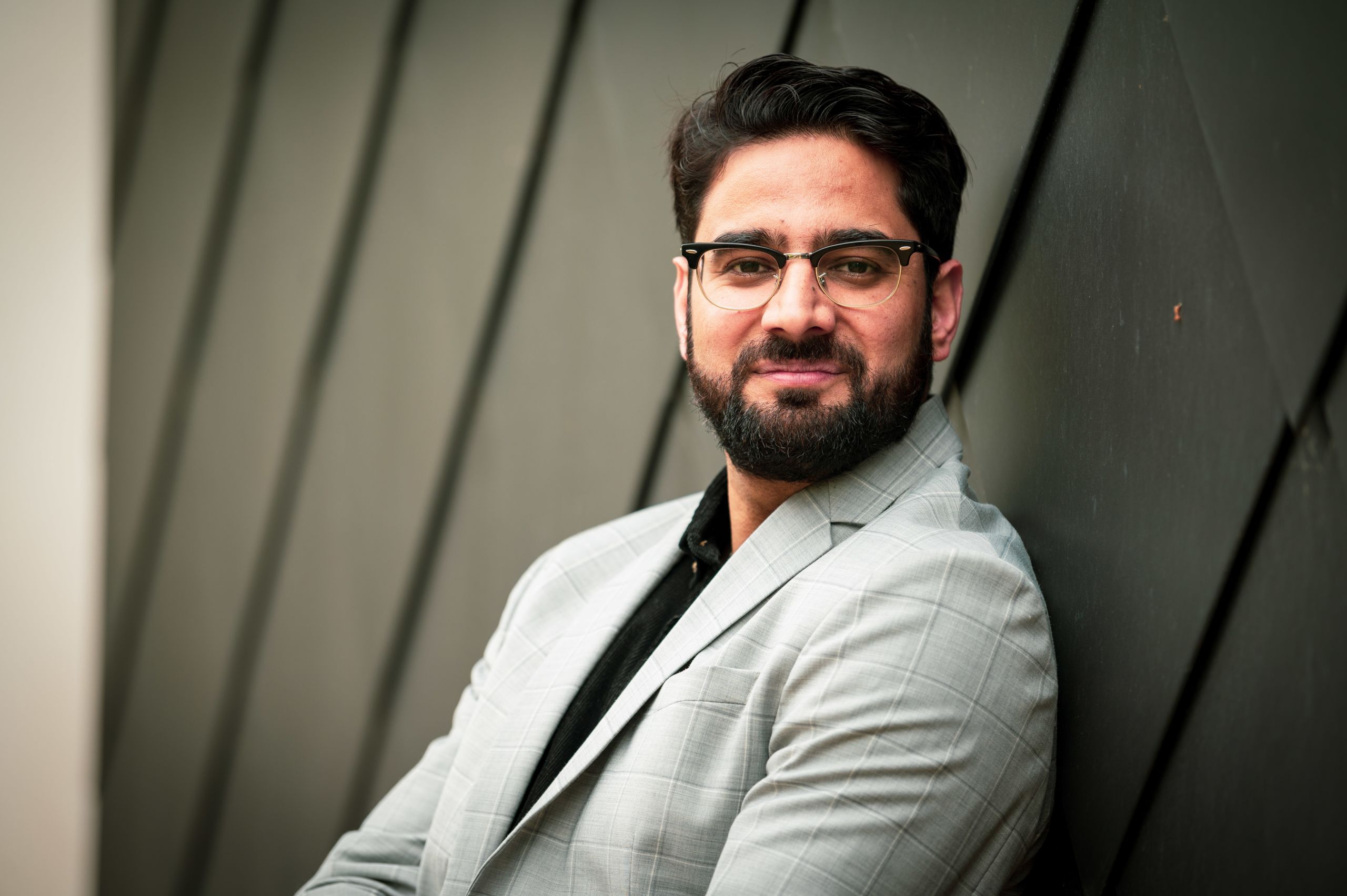
Pictured: Touseef Yousuf Mir
Pictured: Touseef Yousuf Mir
When the pandemic reached the UK last year, a group of international students at UEA realised how precarious life would become in their home country of Kashmir and launched Pe’nd Online.
Pe’nd Online - led by Touseef Yousuf Mir (School of International Development), Nawal Nasir (Norwich Medical School) and Ajaz Bhat (School of Psychology) together with colleagues Iffat Rashid, Mohammad Tahir and 20+ volunteers from Kashmir - promotes active dialogue on issues affecting Kashmiris living all over the world. Initial programmes focused on dispelling myths around the pandemic. But since then, the organisation has hosted regular weekly panel discussions engaging with professionals from a wide range of backgrounds discussing issues such as casteism, conflict, women empowerment, health and mental well-being, sustenance and resilience amid the conflict.
Within less than a year, Pe’nd Online has 33,000 followers and hosted fifty live panels with some of the most popular panel discussions amassing ~485,000 views. The project has broken down stereotypes; combining an educational agenda with a revolutionary approach and achieved credibility and respect amongst Kashmiri populations globally.
The team have recently started a fundraiser to send oxygen concentrators to Kashmir in association with two Kashmiri charities. Future plans include a regular podcast on Indigenous Literature (Kashmiri, Urdu) and Kashmir's first live tracking of conflict database.
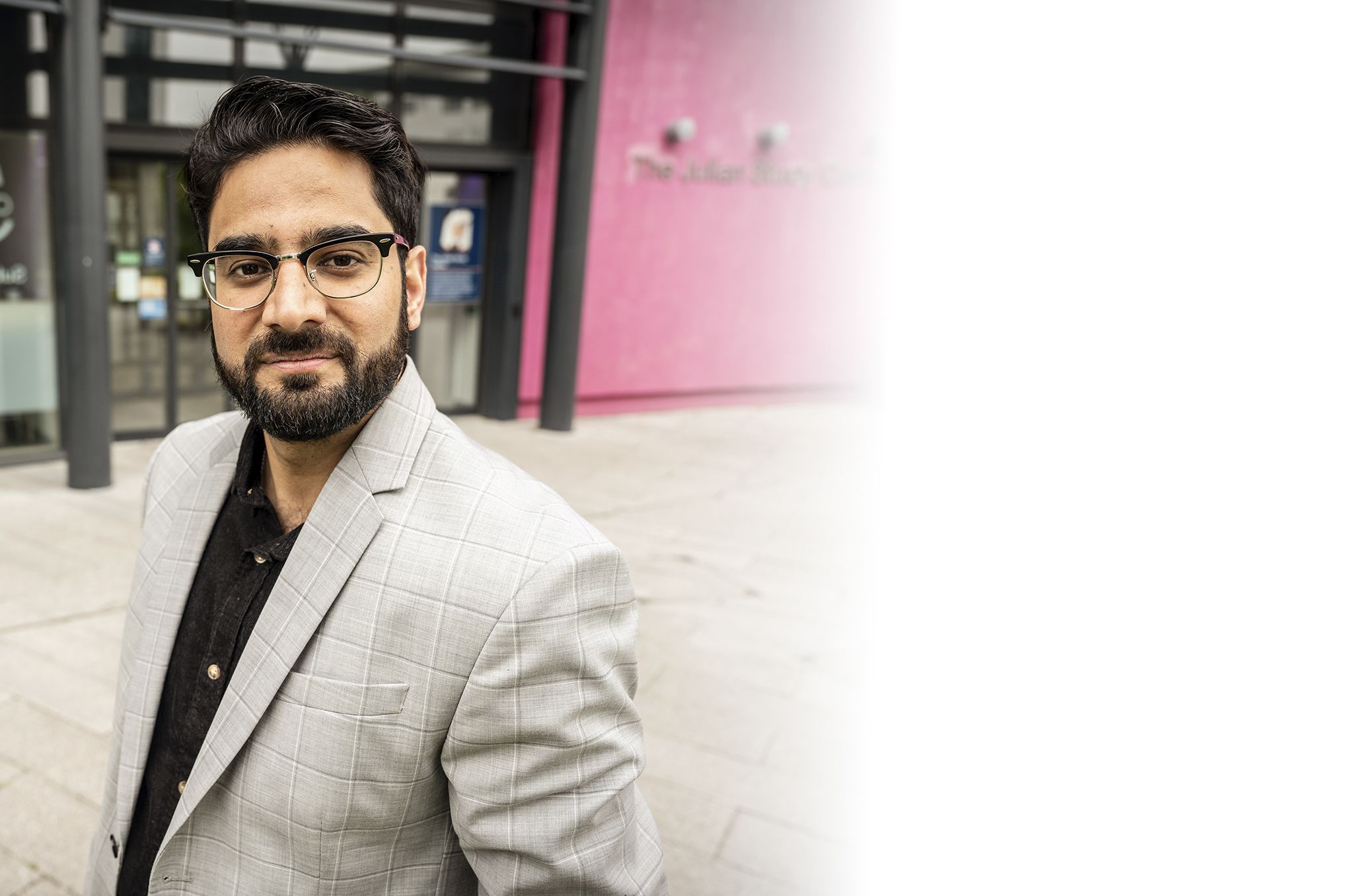
PROJECT AWARDS

UEA SPORTSPARK:
NHS KEY WORKERS HOLIDAY CLUB
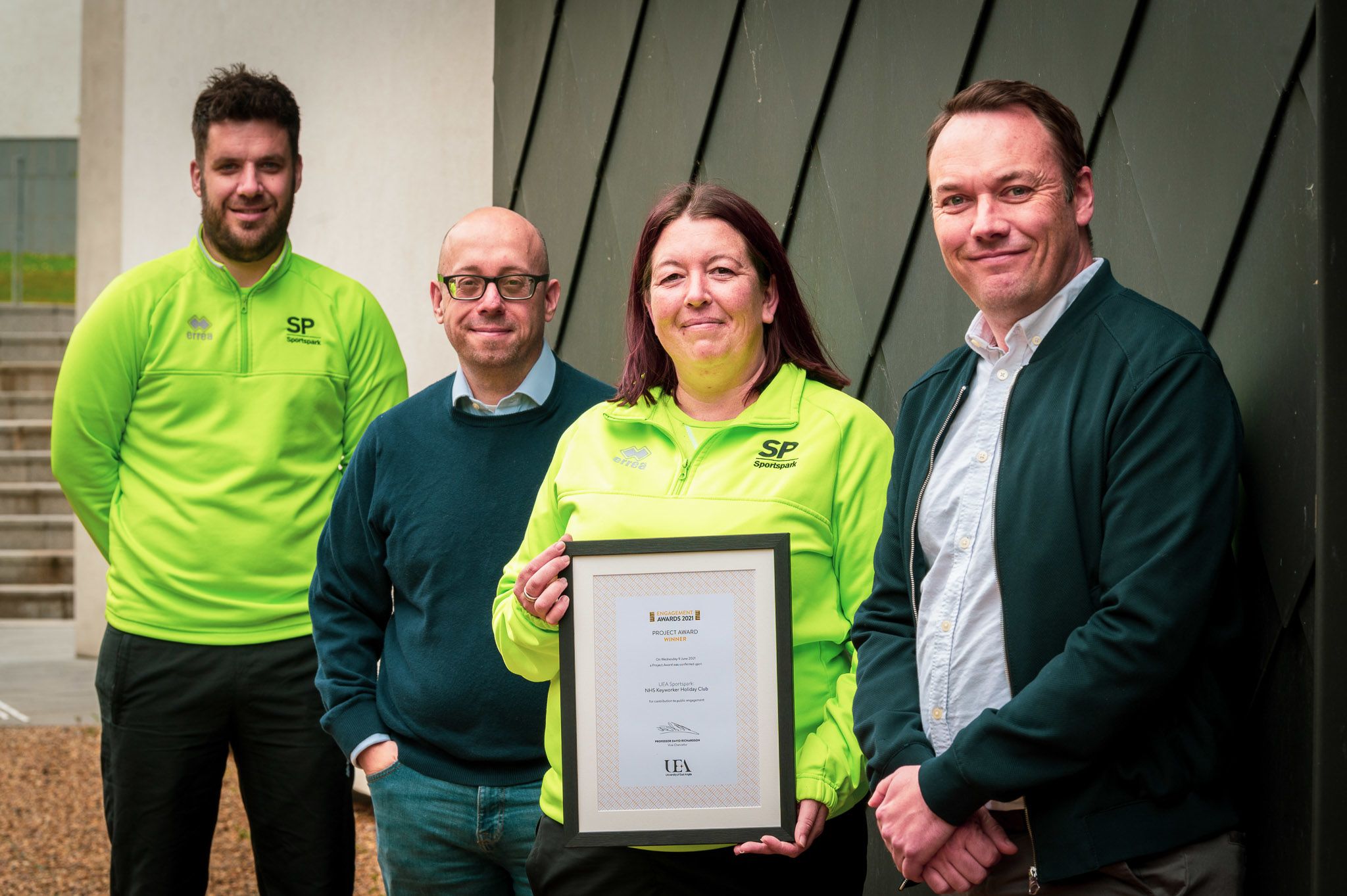
l to r: Sean Pasque, Mark Hitchcock, Gemma Long and Mark Heazle
l to r: Sean Pasque, Mark Hitchcock, Gemma Long and Mark Heazle
“The Holiday Club has been a godsend. We could concentrate on our jobs knowing our daughter was in a safe environment under the supervision of highly skilled staff of superheroes” - Parent
Early on in the pandemic, with schools closed and unable to provide care for the duration of NHS staff shifts, the team at UEA’s Sportspark team felt they needed to take swift action to assist UEA Health and Social Care Partners.
The Sportspark opened on 7 April to offer an extended hours childcare service between 8am and 8pm from Monday to Friday. Children who attended received a healthy packed lunch and evening snack as part of the day, courtesy of UEA Campus Kitchen, and were given information to educate them on what they could do to minimise the potential risk of spreading coronavirus.
The service, which involved staff and student volunteers, remained free of charge to NHS employees up until 3 July due to receiving funding support from Santander Universities. During that time, the programme offered places to over 120 children of NHS workers and over 16,000 hours of care.
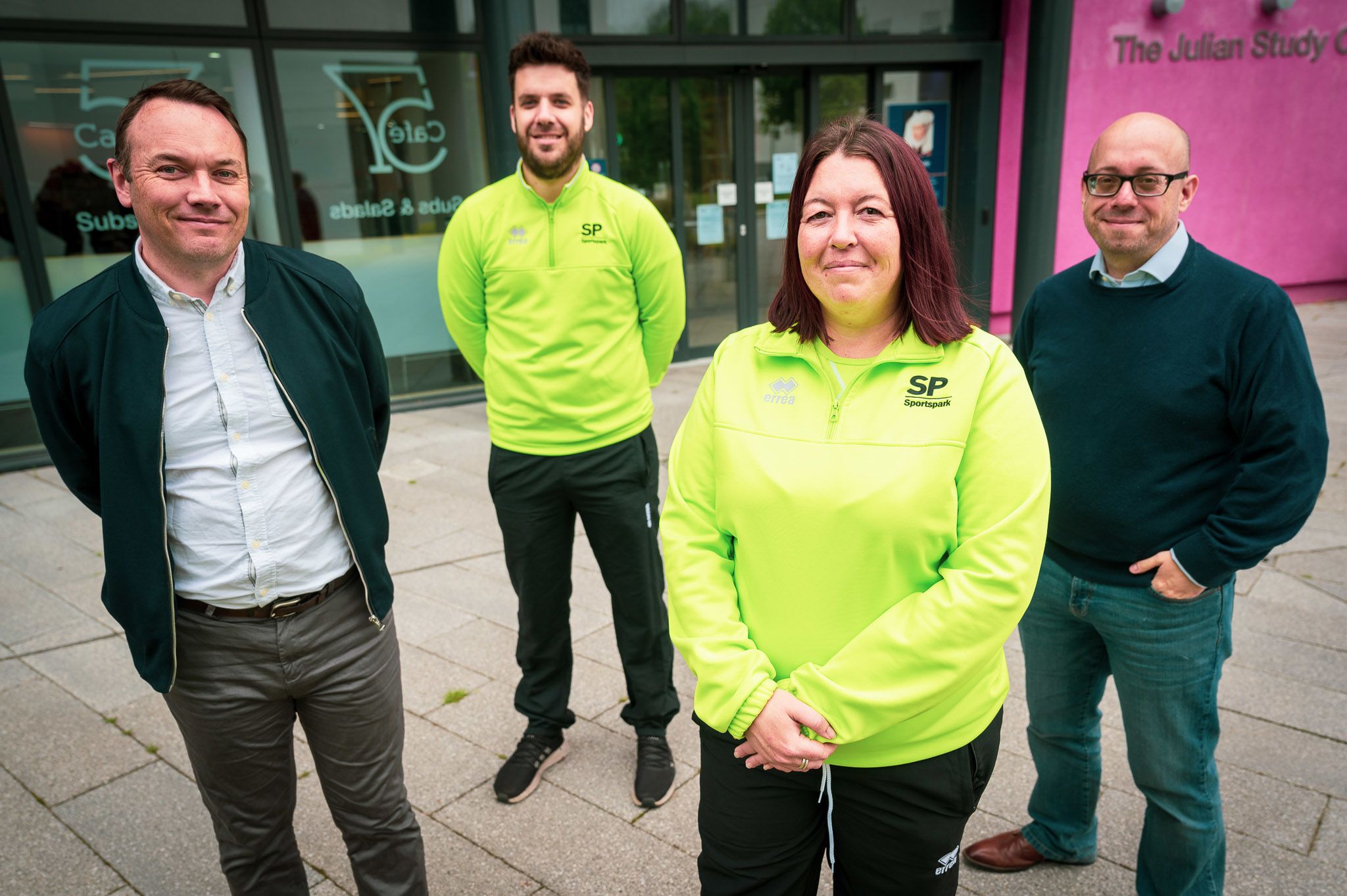
SPECIAL RECOGNITION PROJECT AWARD
PROF EYLEM ATAKAV
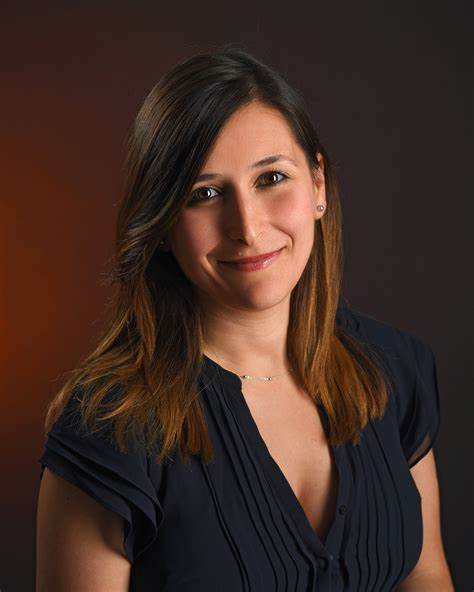
“The key role we play as academics is to collect stories and create visible evidence of the present, and of the feminist-led activism on violence against women” - Prof Eylem Atakav
Between June and September 2020, Prof Eylem Atakav (School of Art, Media and American Studies) recorded just under thirty interviews with people working in the frontline of domestic abuse services in the UK. Together with UEA colleague, Karoline Pelikan, she created a short documentary: Lifeline, to highlight the reality of frontline work in, and to shed light on the impact of lockdown on the domestic abuse sector in the UK.
The film focuses on the first-hand exclusive account of two keyworkers, and brings together interviews with CEOs of UK charities, parliamentarians, the police, and NHS professionals. The film was released in November 2020 and has received global acclaim with awards and international film festivals.
Lifeline has already had an impact on policy as the UK’s leading organisation on the topic, Safe Lives, created mental health support sessions for the keyworkers of the domestic abuse sector as a direct result of this research and film.
OUTSTANDING PROJECT AWARD
DR EMMA GILBERTHORPE
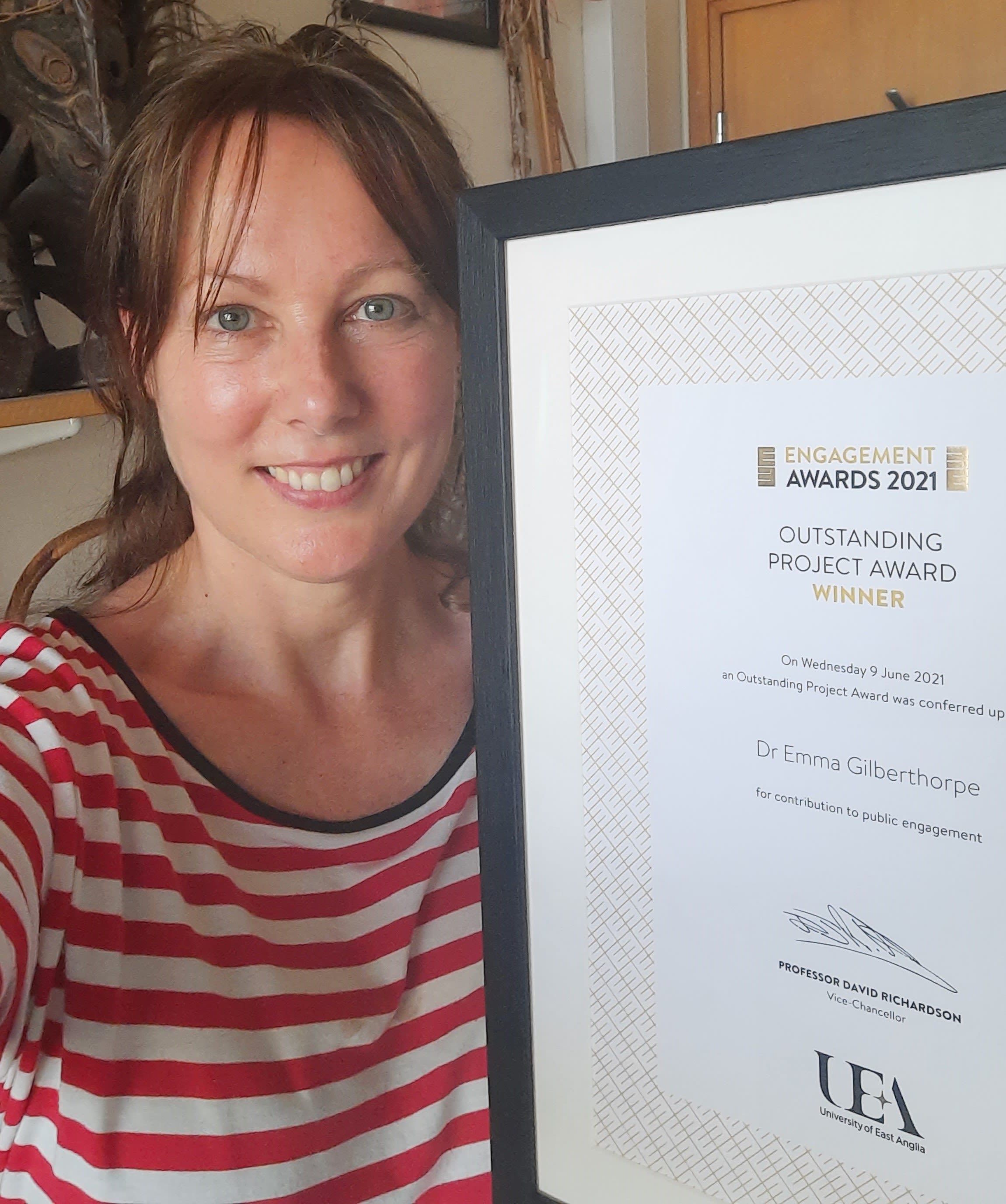
Emma Gilberthorpe uses her discipline - anthropology - to challenge cultural stereotypes through accessible formats. Most recently, and most successfully, she achieved this as a crew member on a four-part series.
The British Tribe Next Door (October to November 2019) saw a ‘British tribe’ relocate to the Otje region of Namibia where they lived with a Himba community for one month. Emma Gilberthorpe (School of International Development) was contracted as the show’s consultant anthropologist, and worked with the series producer to develop an innovative angle that would challenge perceptions of indigenous peoples, by presenting their lives in the contemporary world rather than perpetuating myths of a stagnant ‘tribal’ and ‘exotic other’.
Once commissioned, Emma continued to work on all aspects of the show’s development and convinced Channel 4 to allow her to do a social impact assessment; a first for a British broadcasting company.
Emma’s involvement and commitment to the balanced and considered representation of the Himba people has created a sea change in the way indigenous peoples are represented on television, and in the way production companies and media broadcasters approach working with indigenous participants.
ACHIEVEMENT AWARDS

RUBY O'GRADY
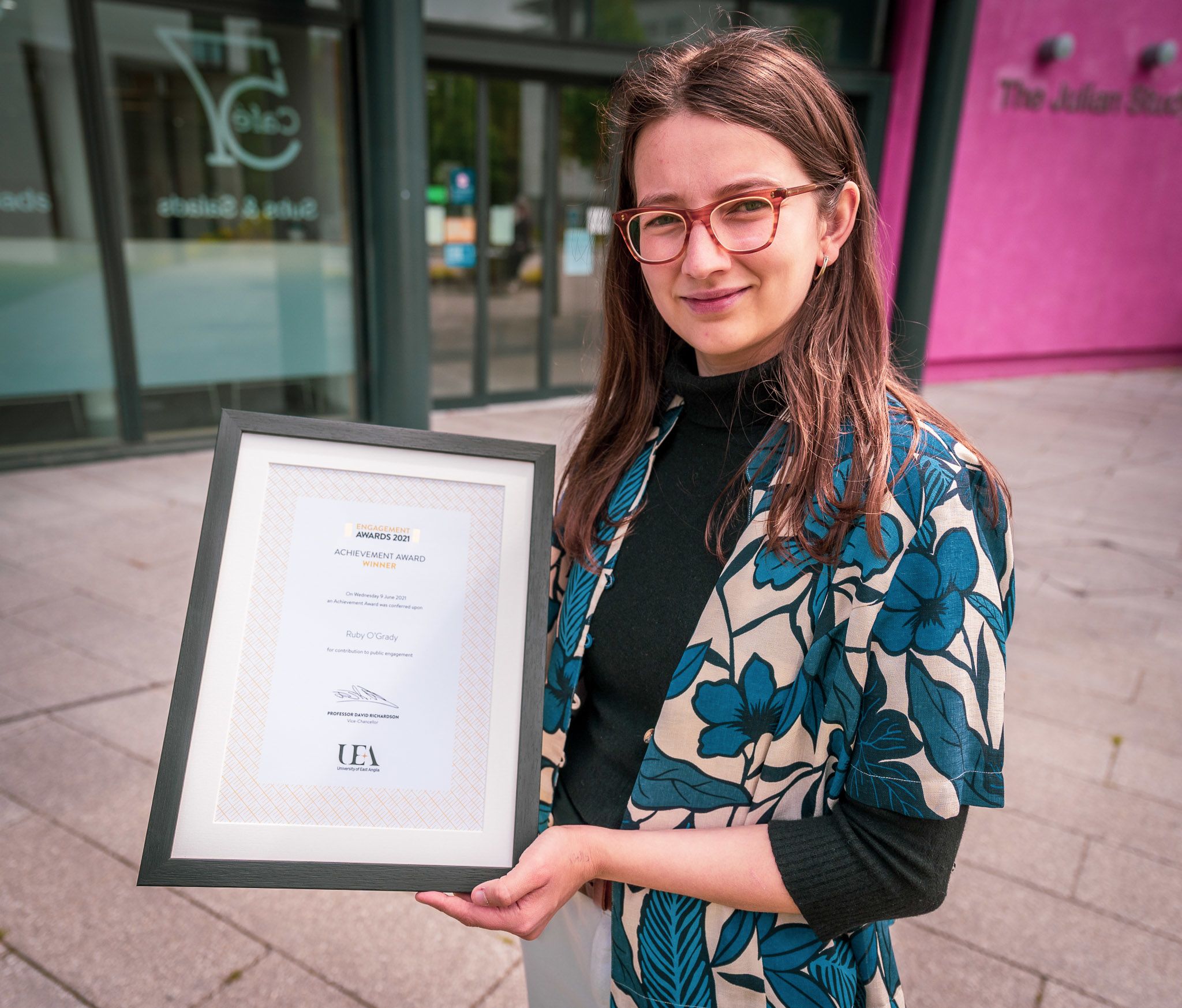
Since joining the John Innes Centre, Ruby O’Grady has made use of animation to communicate fundamental and molecular science to new audiences, developing effective collaborations with the art world.
Ruby O'Grady's skills are self-taught. The example below - Sweet solution - shows how research into RNA structure can be translated into an environmentally-friendly way to protect sugar beet crops from the Yellow Beets virus, and has been well received by the farming community online.
In 2019, Ruby instigated a collaboration with the illustration department at the Norwich University of the Arts to explore engaging ways to communicate the often-complex science at the John Innes Centre (JIC). Pre-pandemic, this resulted in an exhibition in the centre of Norwich showing students’ innovative illustrations of plant and microbial science.
Ruby facilitated a visit by internationally acclaimed artist, Henry Driver, to meet plant health researchers which led to the production of an artwork as part of a call by Science Gallery Bengaluru (SGB) for their exhibition PHYTOPIA. SGB approached JIC as a content partner for the exhibition, managed by Ruby, which has resulted in contribution to three exhibits and an event.
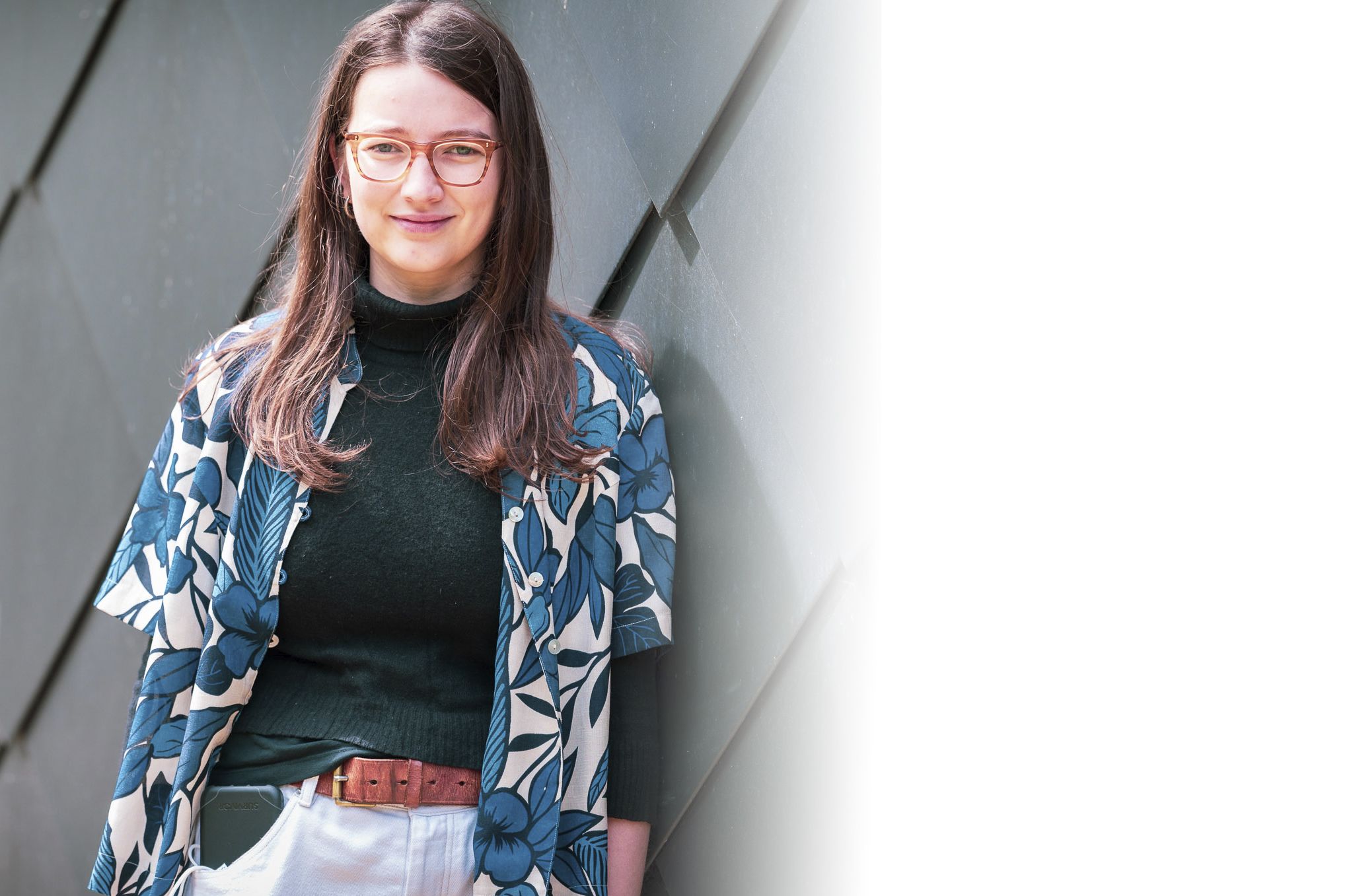
ENABLING ENGAGEMENT ACHIEVEMENT AWARD
UEA MEDIA SUITE
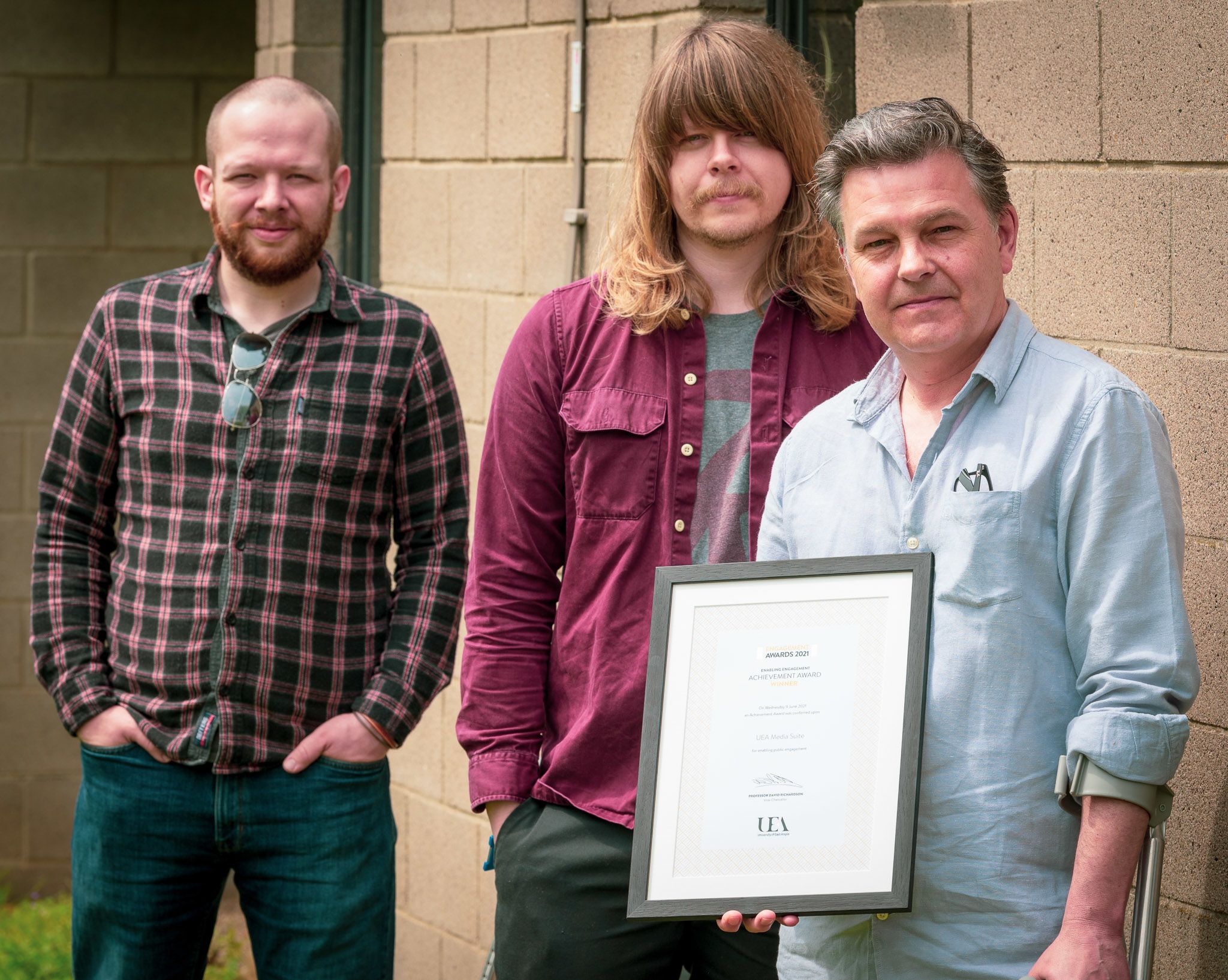
l to r: Alex Plowman, Tristan Holden and Sean Thompson
l to r: Alex Plowman, Tristan Holden and Sean Thompson
The Media Suite supports UEA teaching and research activities in all aspects of digital production. Across 2020-21 the team gave their expertise to additional projects with goodwill, patience and skill.
As well as supporting colleagues at UEA, the Media Suite team, led by Sean Thompson, work with external partners such as the BFI Film Academy for the acclaimed Norfolk and Suffolk programme for 16-19 year-olds run by Creative Nation. They also worked with Norwich Castle Museum for the Lines of Sight: W.G. Sebald’s East Anglia exhibition.
Over the past year the team have kept the facility open with new distancing protocols to enable staff to record and stream from the Media Suite. As public engagement activities had to move quickly to adapt to lockdown, the team were open to collaboration and innovation supporting virtual activities such as Norwich Science Festival at Home:
"The team filmed many hours of footage featuring UEA researchers in a range of sometimes challenging venues, including outdoor and in a games arcade, to help us achieve our vision.” Rachel Watkins, UEA Public Engagement and Events team
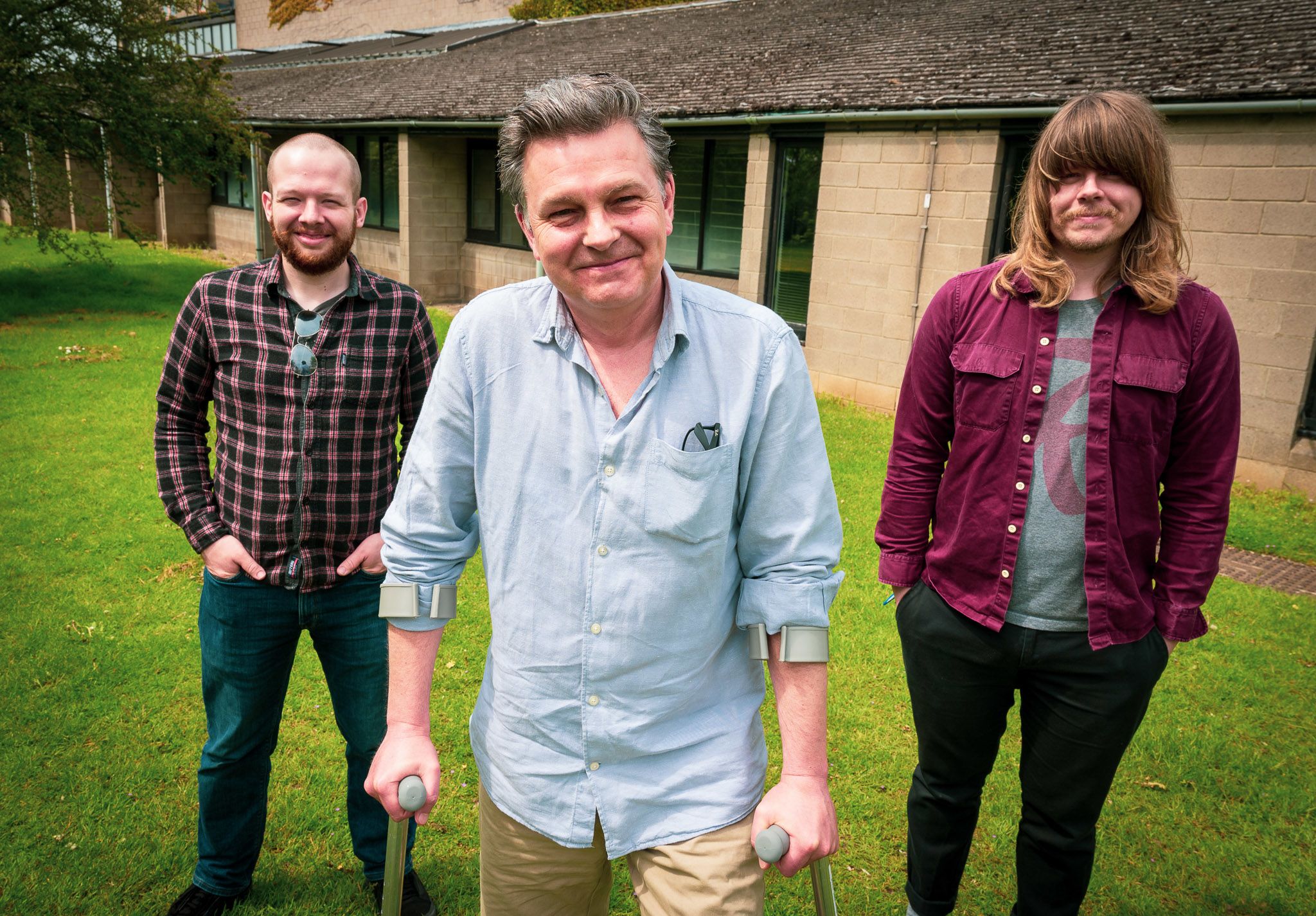
DR SAM ROWE
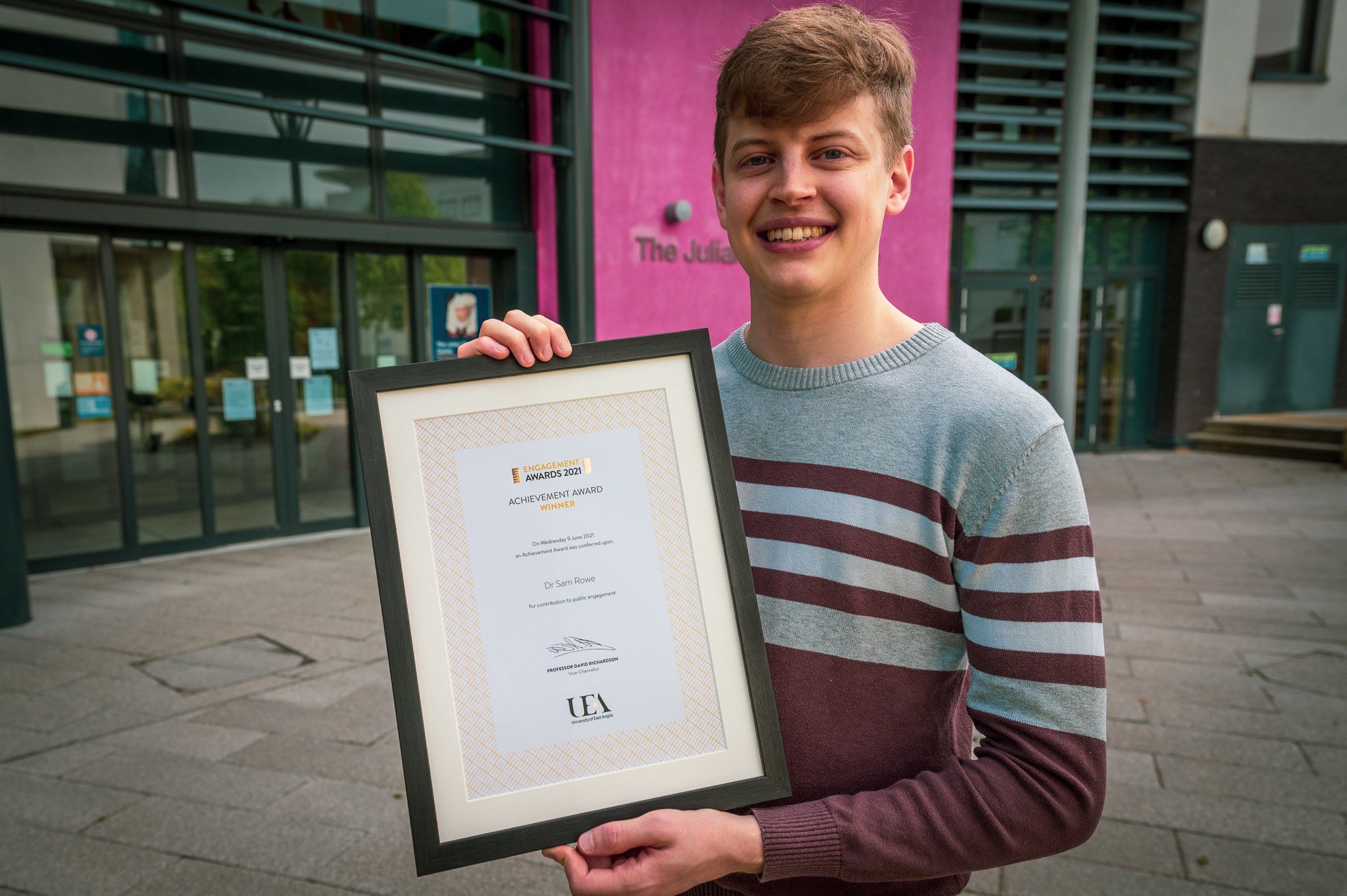
Sam Rowe has been passionate about making science accessible to everyone since he was an enthusiastic undergraduate participating in events, encouraging and championing other researchers to follow his path.
Sam Rowe has been involved in delivery and coordination of numerous projects before and after joining the Earlham Institute in 2021; from hands-on activity stands, explainer videos, written articles, social media posts and training workshops, to guest lectures and pieces for local radio. Sam tailors activities to suit his audience and collects feedback to improve and strengthen the impact of his work.
As the first in his family to go to university, Sam understands the vital role of science communication in removing barriers to accessing science knowledge. Also, as part of the LGBTQ+ community he talks openly and honestly about his experiences.
After completing his PhD at UEA in 2018, Sam continued to collaborate with Norwich Research Park colleagues with projects such as Developing Experts and, at Norwich Science Festival, a science trail called Hidden Elements. Sam has been a City Coordinator for Pint of Science in Norwich since 2019.
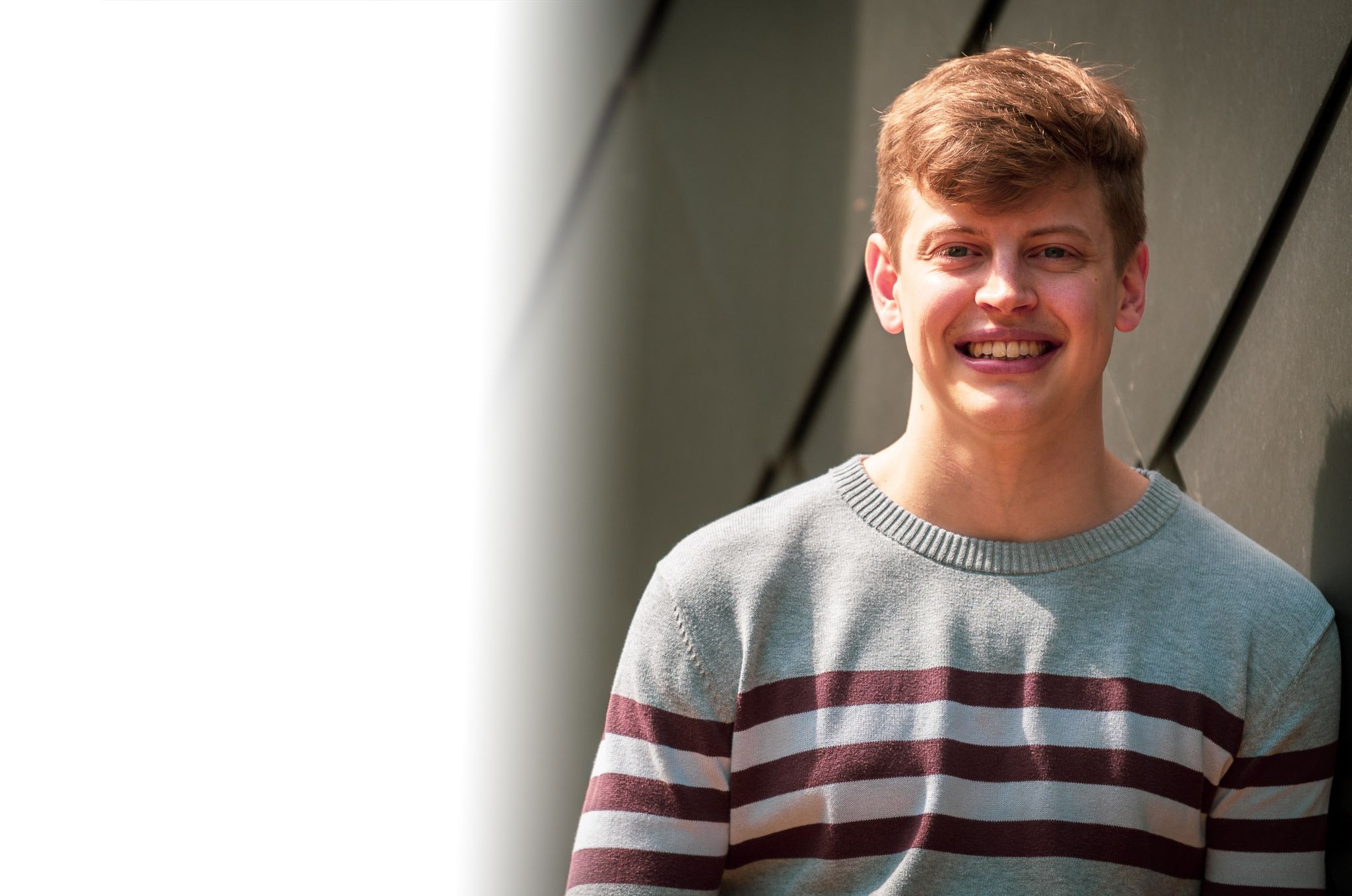
GROUP ACHIEVEMENT AWARD
PRE-UNIVERSITY SKILLS PROGRAMME - DIRECTOR: DR HARRIET JONES
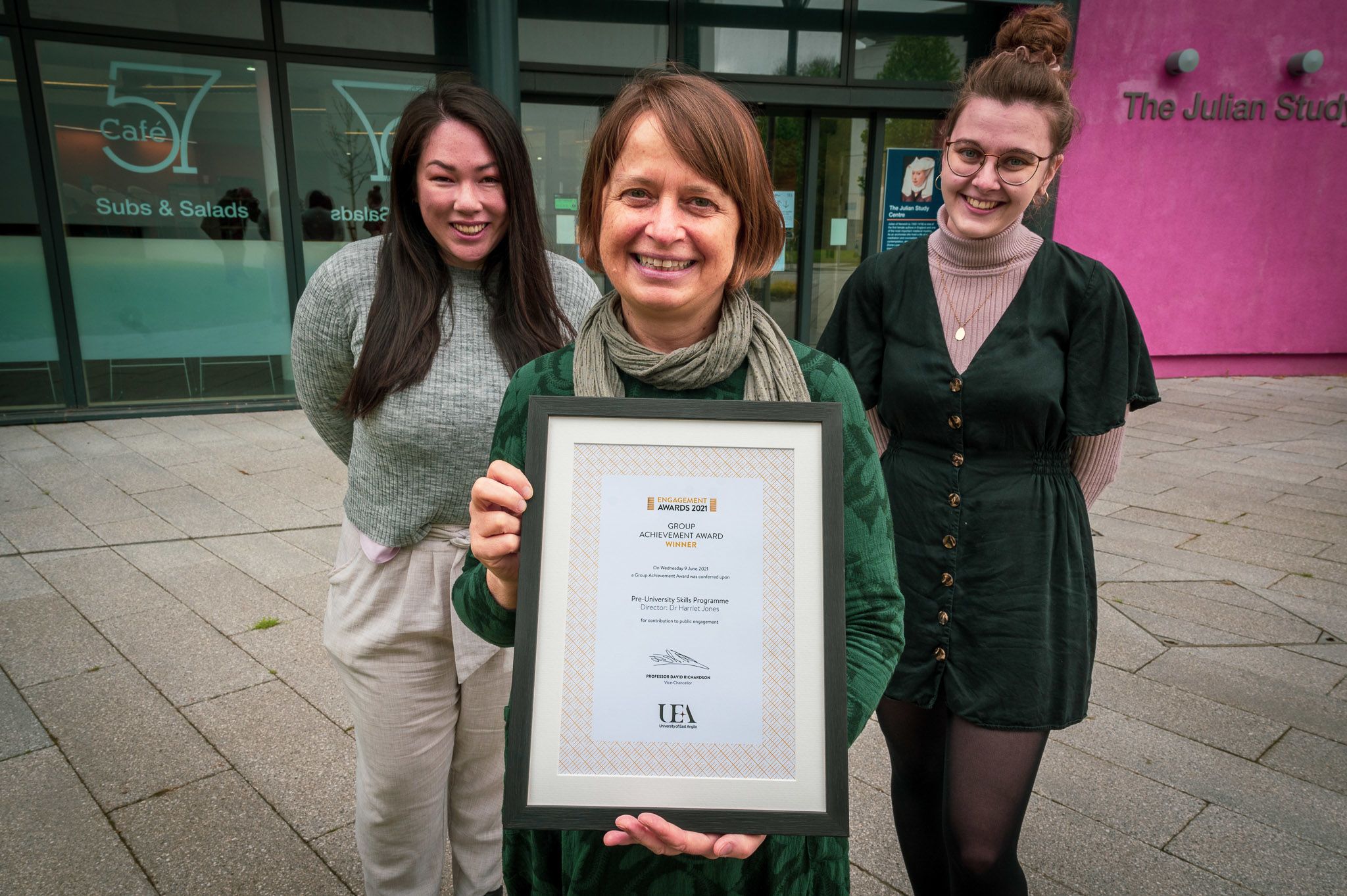
l to r: Stephanie Jong, Harriet Jones and Heather Monsey
l to r: Stephanie Jong, Harriet Jones and Heather Monsey
Over the last 10 years, significant and continued work has grown UEA’s Pre-University Skills Programme to address concerns, provide resources and support students in their academic transition to university.
UEA’s Pre-University Skills Programme was launched in 2011 after consultation with Norfolk County Council and engagement with local schools, colleges and teachers alongside, multi-disciplinary expertise from UEA. An initial pilot of the Pre-University Skills Course showed a marked improvement in pupil skills and grades. Since then, Programme Director Harriet Jones (School of Biological Sciences) has been invited to over 25 events to engage with school and college teachers.
The Programme has funded the creation of the six-week long Preparing for University MOOC (Massive Open Online Course) on FutureLearn. The MOOC has been completed by 74,431 participants in 203 countries, including refugees and asylum-seekers.
In 2019, revised content for the MOOC embedded inclusive practice in line with UEA’s Inclusive Education Policy. Working alongside UEA Outreach, the team prepared lesson plans for teachers supporting accessible online home learning during COVID lockdowns. 1,415 views of the online material demonstrate the importance of support during the pandemic.
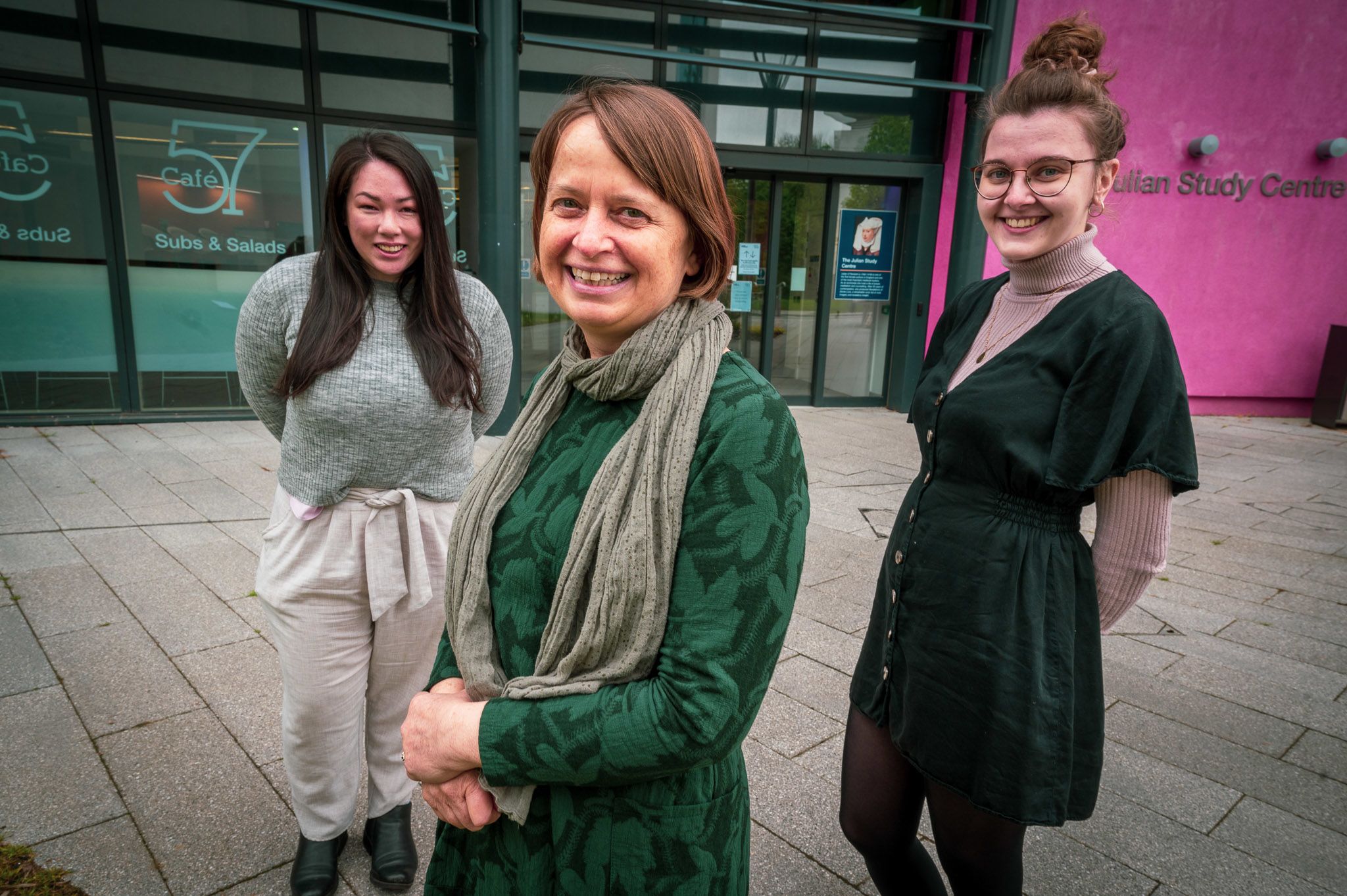
SPECIAL RECOGNITION ACHIEVEMENT AWARD
DR KATE BLAKE-HOLMES
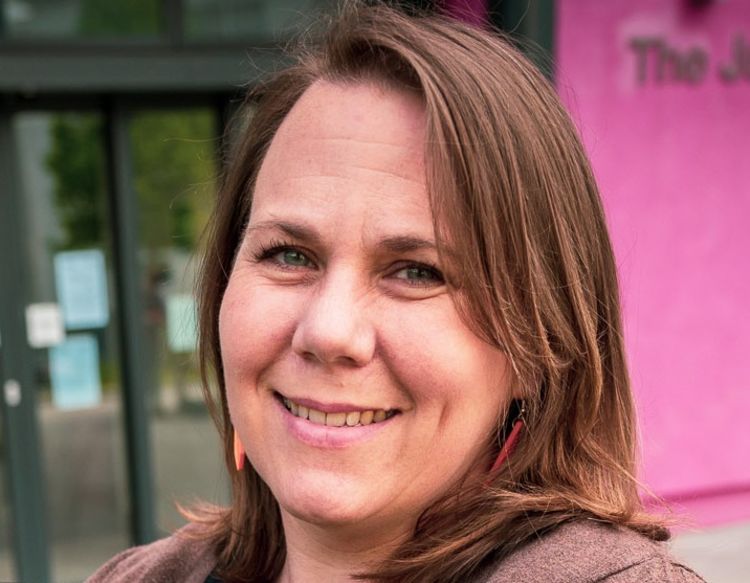
The beginning of lockdown 2020 moved Kate Blake-Holmes to act on concerns she had about the implications for young carers: an already high-risk group of children and young people.
Kate Blake-Holmes (School of Social Work) reached out to local carer’s organisation Caring Together and offered to engage in a piece of research with them. The study aimed to explore the impact of the COVID-19 lockdown restriction on young carers and benefit them by increasing recognition and awareness of their needs. Throughout lockdown, views of young carers about their current experiences were captured and used to inform the provision of effective support and identify urgent support needs.
Kate designed the project with young people from the Norfolk Young Carers Forum, and participants were recruited with the support of regional young carers groups. Interviews with 20 young carers were analysed and in June, key findings were published and presented to professionals and practitioners nationwide.
Kate’s responsive research gave considerable voice and recognition to young carers (both locally and nationally) at a time when their needs could have been overlooked.
